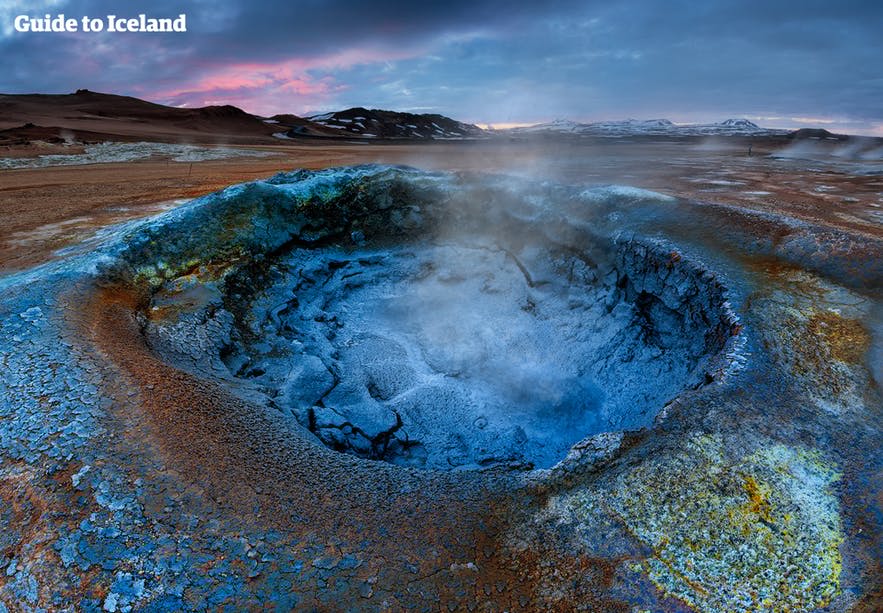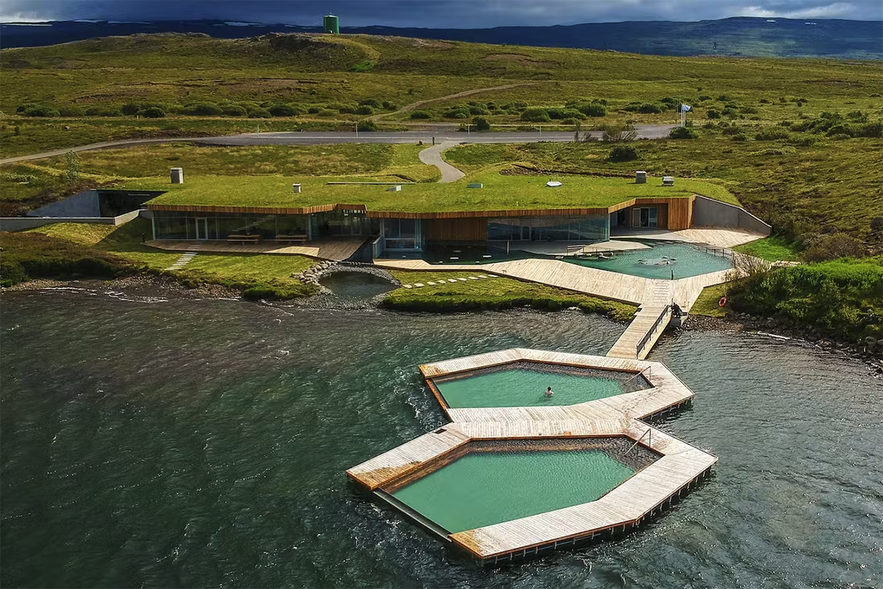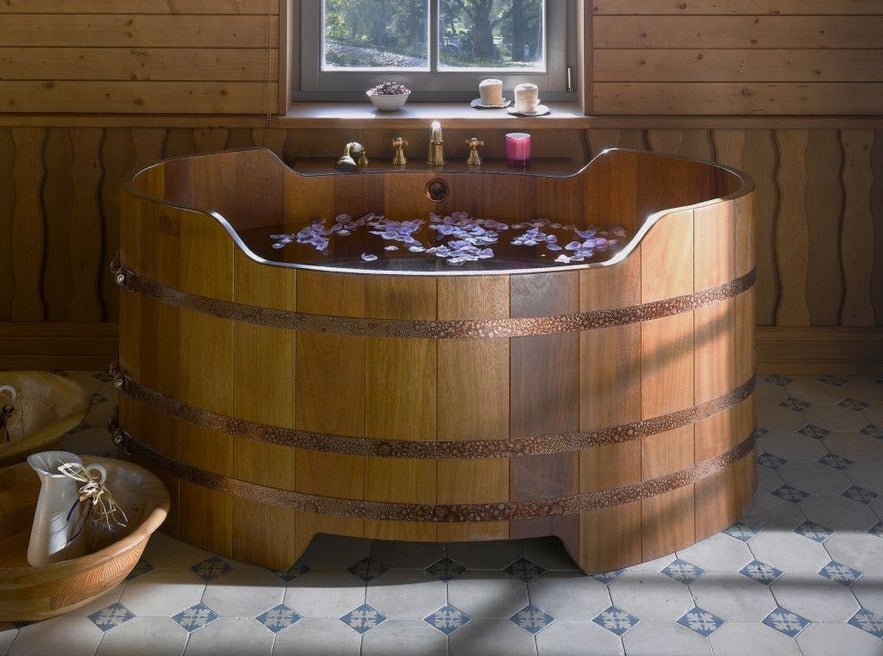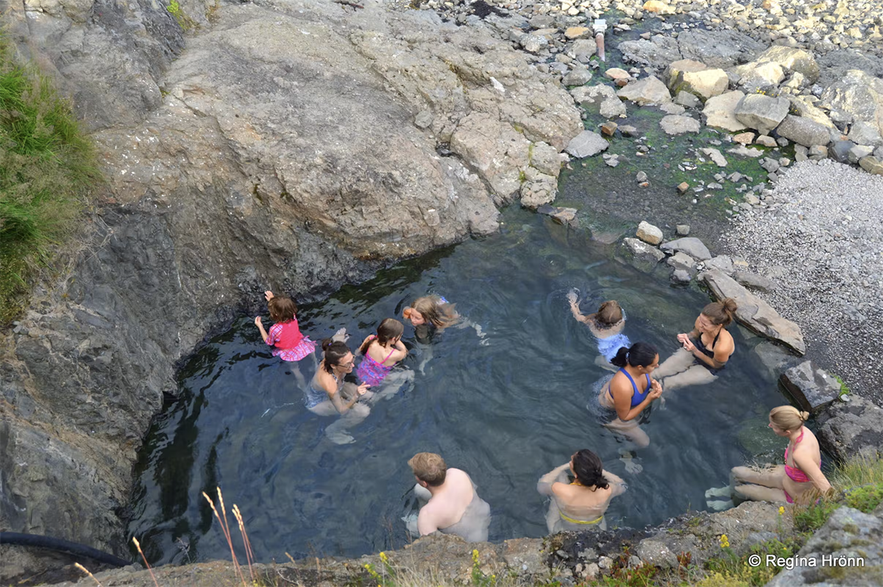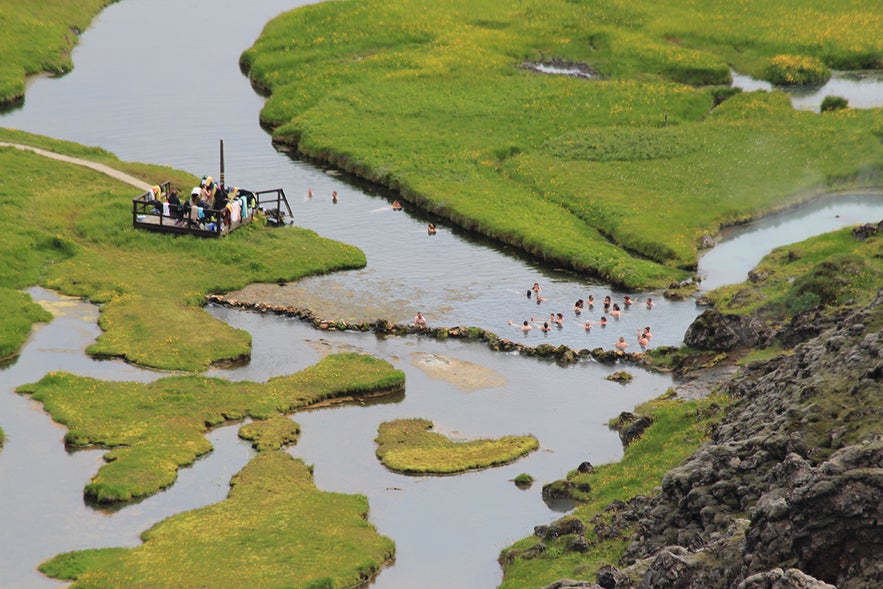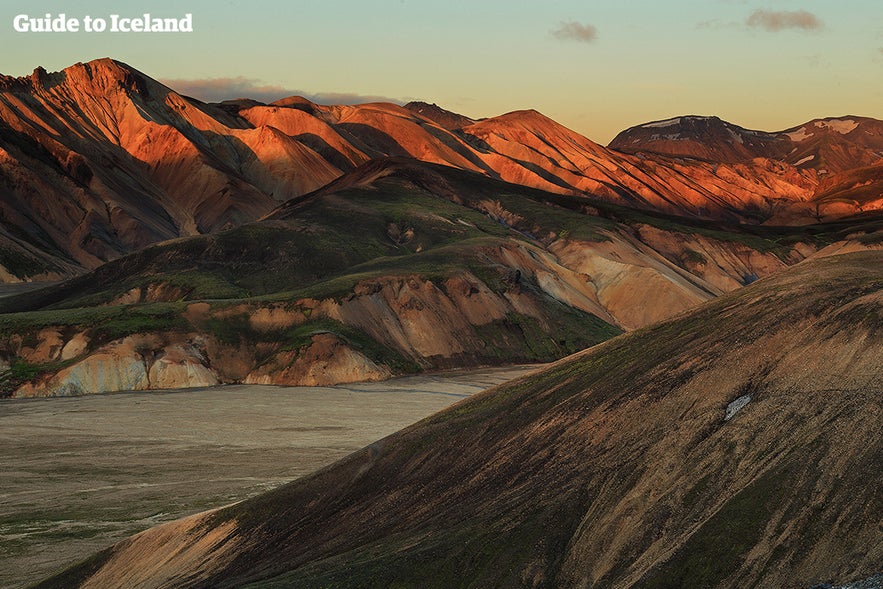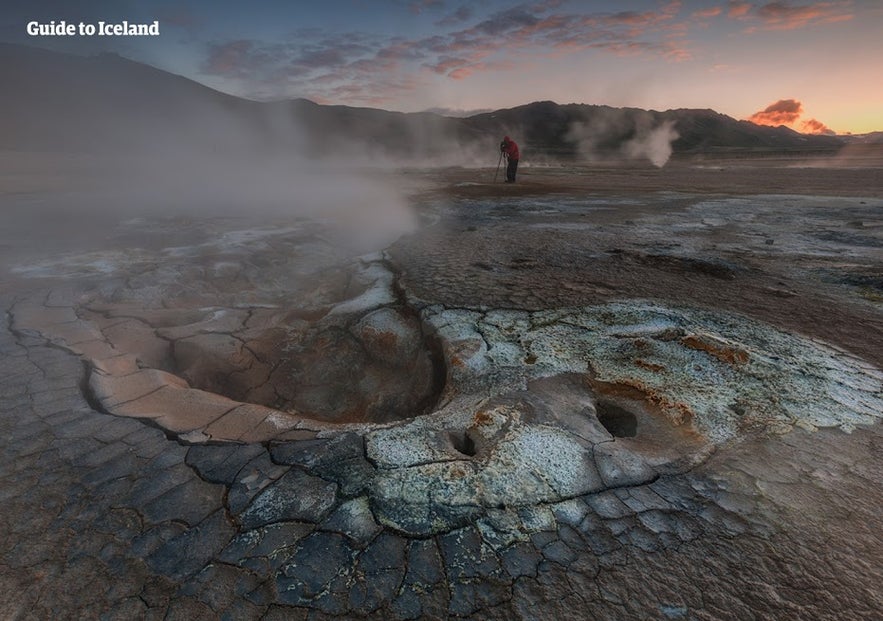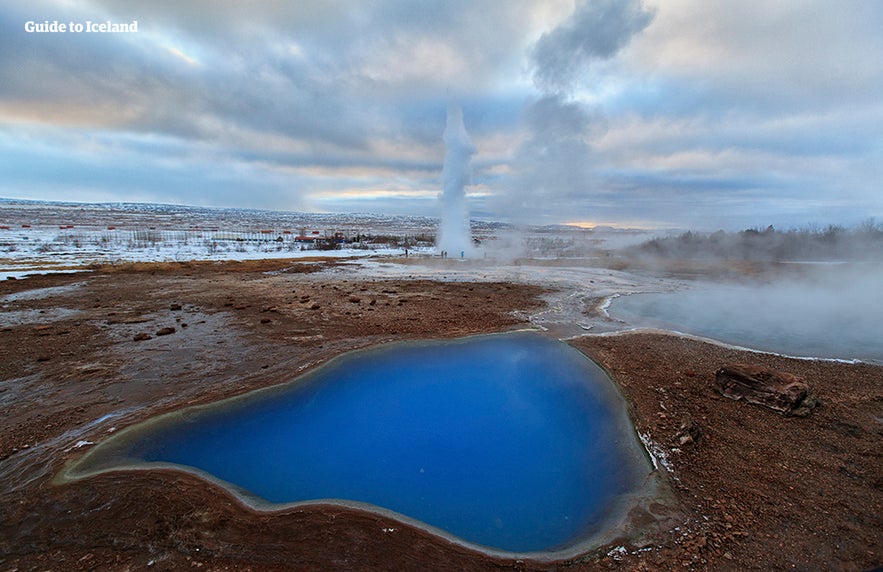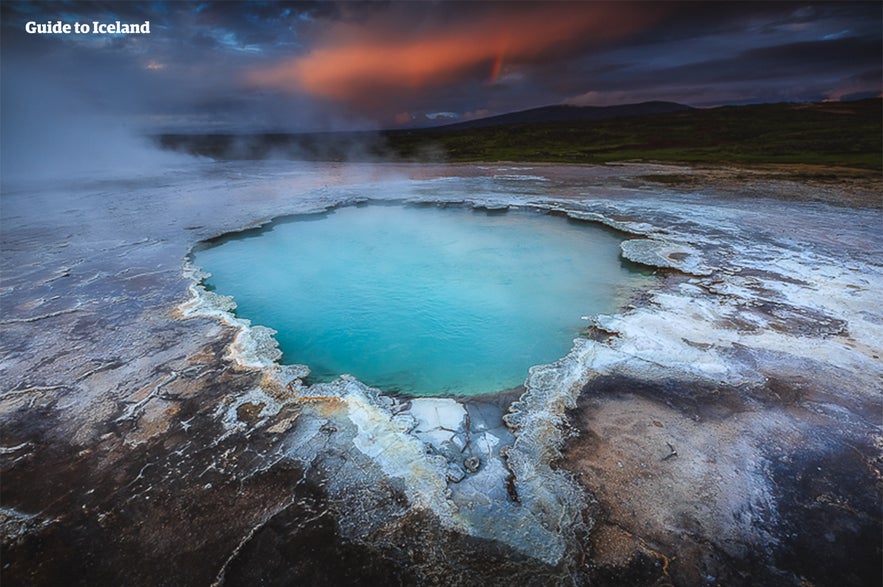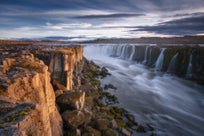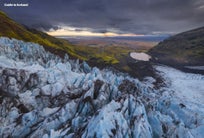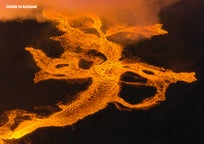
The 30 Best Hot Springs and Geothermal Pools in Iceland
- Top 10 Hot Spring Spas in Iceland
- 1. The Blue Lagoon
- 2. Sky Lagoon
- 3. Hvammsvik Hot Springs
- 4. Myvatn Nature Baths
- 5. Vok Baths
- 6. Forest Lagoon
- 7. GeoSea Sea Baths
- 8. Fontana Geothermal Baths
- 9. Krauma Spa
- 10. Bjorbodin Beer Spa
- Top 5 Best Geothermal Pools in Iceland
- 1. Secret Lagoon
- 2. Seljavallalaug
- 3. Krossneslaug
- 4. Hreppslaug
- 5. Hljomskalagardur Wading Pool
- Top 5 Hot Tubs in Iceland
- 1. Drangsnes Hot Tubs
- 2. Gudrunarlaug
- 3. Nautholsvik
- 4. Hoffell Hot Tubs
- 5. Kvika Foot Bath
- Top 5 Natural, Free Hot Springs in Iceland
- 1. Reykjadalur: An Icelandic Hot Spring Thermal River
- 2. Hellulaug
- 3. Landmannalaugar
- 4. Laugavallalaug
- 5. Viti in Askja
- Top 5 'No Bathing' Hot Springs & Pools in Iceland
- 1. Geysir
- 2. Grjotagja
- 3. Snorralaug
- 4. Blahver
- 5. Brimketill
- FAQ About Hot Springs and Lagoons in Iceland
- What are the benefits of soaking in a hot spring?
- Are there any hot spring resorts in Iceland?
- What are lagoons in Iceland?
- Why are hot springs popular in Iceland?
- How are hot springs formed in Iceland?
- What are Iceland's geothermal pools and spas like?
- Can you bathe in all Icelandic hot springs?
- What’s the difference between a hot spring and a lagoon?
- Are hot springs accessible year-round?
See this list of all the best hot springs and geothermal pools in Iceland. Find out where to find all the best natural Iceland hot springs. As well as all the spas and geothermal pools in Iceland.
Iceland is a country of striking contrasts, where geothermal heat and glaciers coexist to shape its unique landscapes. Often called the "land of fire and ice," it’s a place filled with natural wonders like waterfalls, lakes, and hot springs that can be enjoyed in any season.
Soaking in a hot spring is a classic Icelandic experience. Whether it’s a natural pool tucked away in the countryside or a modern spa with all the comforts, these geothermal gems offer a relaxing way to connect with the island’s nature. There’s something for everyone to enjoy, even if some hot springs are best admired from a distance.
Browse the largest selection of hot spring tours in Iceland and find the most affordable ticket to the Blue Lagoon in Iceland. If you prefer to drive there yourself then rent a car on the cheapest and largest car rental marketplace in Iceland. While going hot spring hopping from region to region, find the best place to stay on Iceland's largest selection of accommodations.
Read on to learn about the top 10 lagoons in Iceland, the best 5 geothermal pools, the ultimate 5 hot tubs, and the 5 best natural hot springs. As well as hot springs you can't bathe in and why.
Iceland's landscape is characterized by contrasts. The island sits on one of the Earth's 'hot spots,' resulting in a lot of geothermal activity. Additionally, because of its location near the Arctic, there are a wealth of glaciers across the country. That is why it's sometimes called the Land of Ice and Fire.
The mixture of geothermal activity has created numerous waterfalls, lakes, and hot springs all over the island you can enjoy all year round, no matter what the weather!
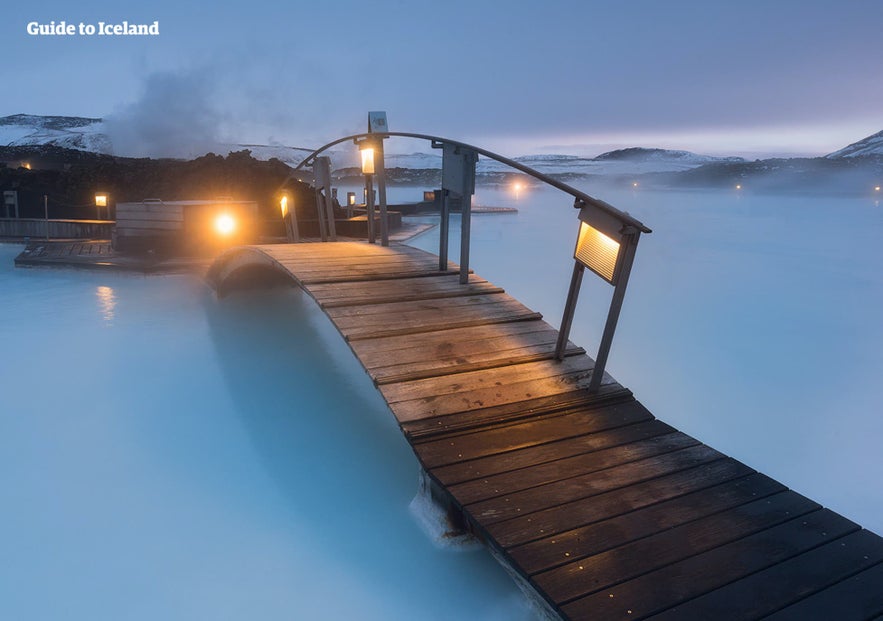
Almost half of the hot water in the capital region is geothermal water. It comes boiling from the ground and straight into people's homes. Rather than needing to warm it up, it needs to be cooled down to bathe in.
The geothermal water is the reason for the many heated swimming pools across the country - with 18 in the greater Reykjavik area alone! All of these thermal pools in Iceland will provide you with soothing, warm waters that are perfect for relaxing in. Visiting Iceland's geothermal pools is one of the more affordable things to do in the city.
Unlike the swimming pools, Iceland's hot springs occur naturally. Because of this, some are in hard-to-reach areas you need to hike to, while you can reach others easily by car.
Some of Iceland's hot springs are boiling fumaroles, bubbling mud pits, or spouting geysers, but others are calm pools of water that are the perfect temperature to bathe in.
Many of these have become popular bathing spots. Some places have natural hot water emerging from the ground but are unsuitable for bathing. In those cases, locals build a pool to contain the water. Sometimes the water is too hot for a dip but is at just the right temperature after mixing it with cold water.
You can find hot springs of all sizes and shapes in Iceland, entirely natural ones or those that have had a little help to maintain a balanced temperature.
The term 'hot spring' is sometimes an ill-defined one. People have different opinions on what can be considered a hot spring in Iceland. You could describe some 'hot springs' as simply warm pools, spas, geothermal lakes, swimming pools, or even geysers.
No matter the nomenclature, bathing in Iceland's hot springs is very popular with travelers and locals alike. Their versatility is so great that they should appeal to all types of travelers.
Top 10 Hot Spring Spas in Iceland
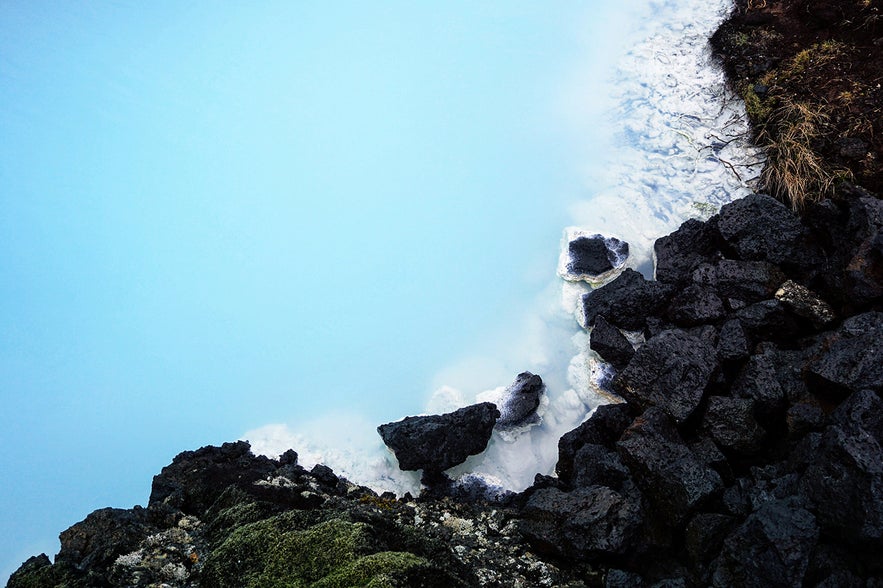
Many of Iceland's natural hot springs are free to enter, but since they are located under the open sky in the countryside, they lack changing rooms, showers, or bathrooms.
Therefore, several other hot springs and pools charge entry, but in return, they have excellent guest facilities. These have consequently become the most popular hot springs in Iceland. They would be classified by many people as spas, although they all have a hot spring element.
Discover Iceland's most popular spa-like bathing spots and discover what makes them unique.
1. The Blue Lagoon
The Blue Lagoon is the most well-known and famous hot spring in Iceland by far. It's even been named one of 'The Top 25 Wonders of the World' by National Geographic.
The light blue, milky waters have a perfect temperature of 110-102 F (38-39 C). Although the water is entirely natural and contains rich minerals such as silica and algae, the lagoon didn't form naturally. It was created in 1976 by excess water from a nearby geothermal power plant.
It wasn't until 1981 that the first person tried bathing in it, and ever since then, its soothing qualities and healing waters have only increased in popularity.
Today, the lagoon is world-famous and definitely the most impressive spa resort in Iceland. It features several restaurants, cafes, an in-water bar, a hotel, a gift shop, and a relaxing area with massage facilities.
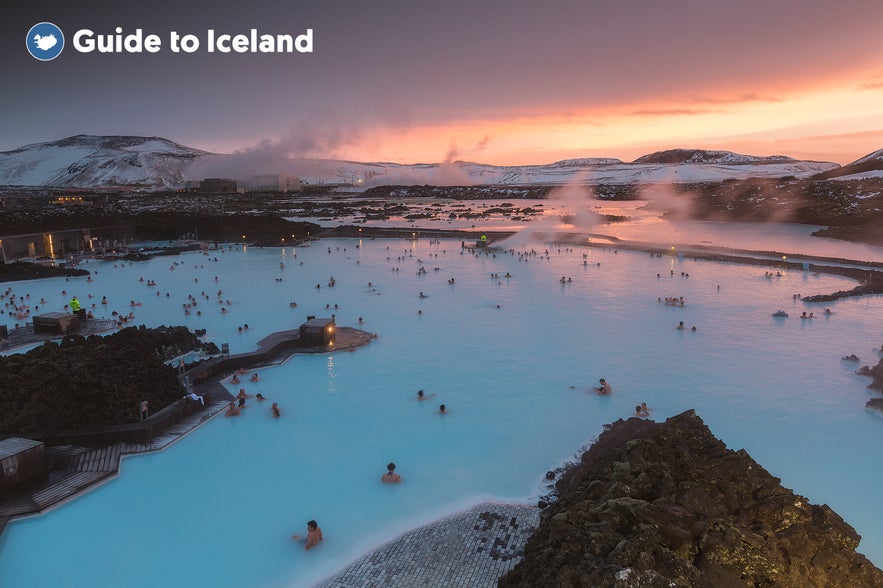
The lagoon is ever-expanding in size, but entry is limited, so it never becomes jam-packed even when it sells out.
Because of this, you will need to book your entry well in advance - and it comes with the highest price tag of all the bathing options in Iceland. If you want to stay close, you can book accommodation near the Blue Lagoon today!
The Blue Lagoon is on the Reykjanes peninsula. It's only 14 miles (23 kilometers) from Keflavik International Airport and 30 miles (49 kilometers) from Reykjavik, making it one of the closest hot springs to Reykjavik and a popular first or last stop for arriving and departing guests.
If you have a short stop in Iceland, you shouldn't miss out on this excellent bathing spot.
2. Sky Lagoon
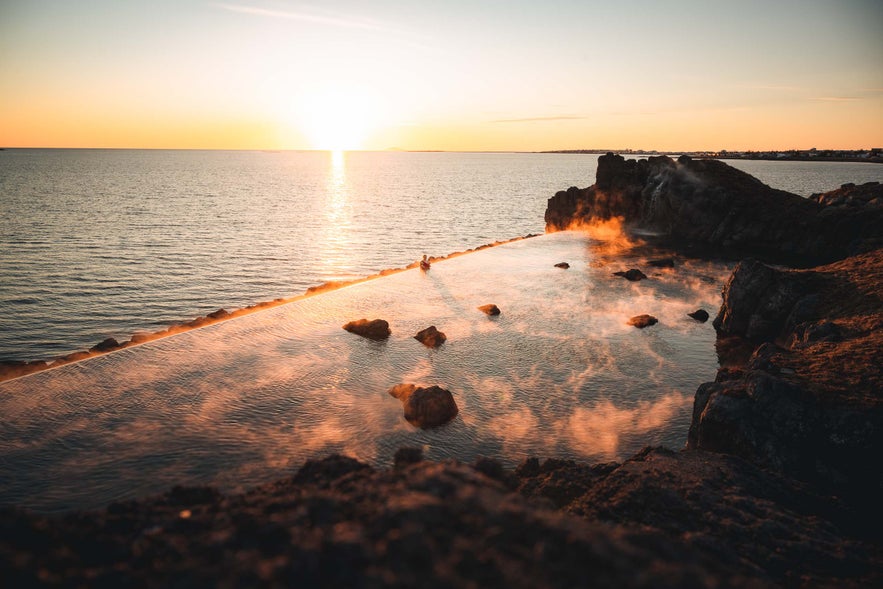 In contrast to the Blue Lagoon, which has been a mainstay in Iceland for decades, Sky Lagoon is fresh on the market and has already become very popular among visitors and locals alike.
In contrast to the Blue Lagoon, which has been a mainstay in Iceland for decades, Sky Lagoon is fresh on the market and has already become very popular among visitors and locals alike.
The geothermal spa opened in 2021 and is located on the edge of the Karsnes peninsula in Kopavogur, a town on the outskirts of the greater Reykjavik area. Therefore, it's very accessible to those staying in Reykjavik, which is only a 15-minute drive from the city center. It's recommended that you book your Sky Lagoon admission ahead of time, and you can even include a transfer from Reykjavik in your entry ticket.
The most distinct characteristic of the Sky Lagoon is its amazing infinity pool, which overlooks beautiful Skerjafjordur Bay. This provides incredible views of the midnight sun during the summer and the northern lights during winter.
The lagoon itself is surrounded by large moss-covered cliffs of lava rock, which provide a genuine atmosphere of bathing in a fantastical natural setting, far away from the ruckus of the city.
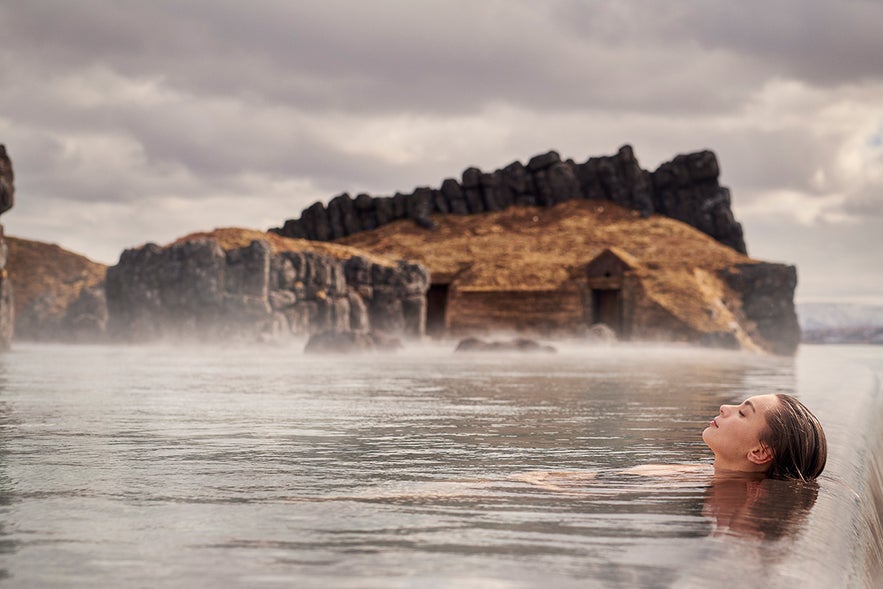 On the premises, you can find a turf house with a cold-water glacial pool, a sauna overlooking the sea, a cold mist room, and a steam room. There is also an in-pool bar that provides alcoholic or non-alcoholic drinks for visitors.
On the premises, you can find a turf house with a cold-water glacial pool, a sauna overlooking the sea, a cold mist room, and a steam room. There is also an in-pool bar that provides alcoholic or non-alcoholic drinks for visitors.
After soaking in the warm geothermal waters for a couple of hours, you might want some hearty nourishment. On-site, you'll find the Sky Café, which provides light meals served café-style, and Smakk Bar, which offers taste plates of unique Icelandic food and drink.
The Sky Lagoon also has its own skincare line, and you can try many of the products during your visit. The Sky Lagoon body scrub is an iconic part of any visit, and purchase these items on-site. If you're a Guide to Iceland customer, you can enjoy a 15% discount with your VIP Club access, so don't forget to use it during your visit!
3. Hvammsvik Hot Springs
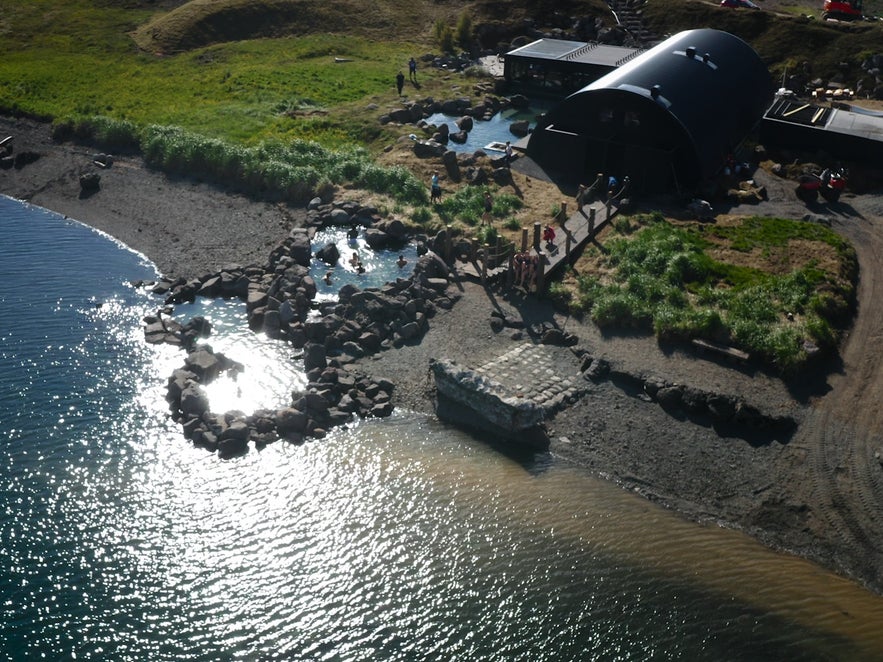 Just outside of Reykjavik, in the nearby fjord of Hvalfjordur, you will find Iceland's newest hot spring bathing spa. Hvammsvik Hot Springs was opened in 2022, with the idea of incorporating the ebb and flow of the tides into the experience of bathing in warm geothermal water. The spa consists of eight natural hot spring pools of various sizes and temperatures, some of them being closer to the shoreline than others. Therefore, when the tide is high, the ocean flows into the geothermal pools that are nearest to the shore.
Just outside of Reykjavik, in the nearby fjord of Hvalfjordur, you will find Iceland's newest hot spring bathing spa. Hvammsvik Hot Springs was opened in 2022, with the idea of incorporating the ebb and flow of the tides into the experience of bathing in warm geothermal water. The spa consists of eight natural hot spring pools of various sizes and temperatures, some of them being closer to the shoreline than others. Therefore, when the tide is high, the ocean flows into the geothermal pools that are nearest to the shore.
This combination of a spa experience with bathing in nature is what makes Hvammsvik such a special place, and it's only a short drive from Reykjavik, making it quite accessible, despite the quiet remoteness of the location once you get there. The facility is a repurposed barracks used during the allied occupation of Iceland in World War II, and includes showers and changing rooms. If you're going for the full 'bathing in nature' experience, there are also outdoor changing rooms where you can shower under the open sky.
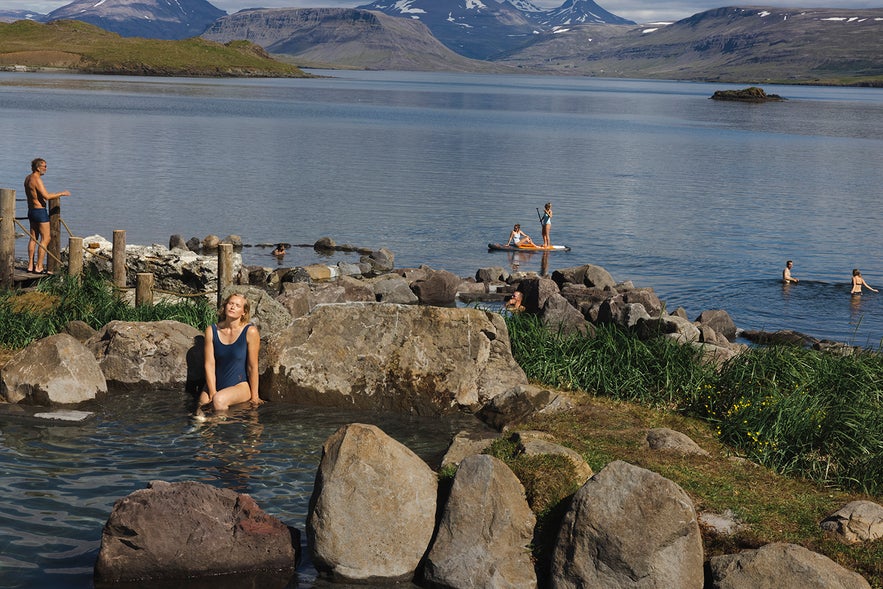 While there, you can engage in various activities if you're so inclined. Hvammsvik provides you with paddle boards so you can go stand up paddling in the fjord, there are regular yoga sessions to be a part of, and you can take a dip in the ocean plunge pool if you're in the mood for a cool refreshment. During the winter, the low light pollution and open skies make Hvammsvik a perfect place to see the northern lights while keeping it cozy in a warm geothermal pool.
While there, you can engage in various activities if you're so inclined. Hvammsvik provides you with paddle boards so you can go stand up paddling in the fjord, there are regular yoga sessions to be a part of, and you can take a dip in the ocean plunge pool if you're in the mood for a cool refreshment. During the winter, the low light pollution and open skies make Hvammsvik a perfect place to see the northern lights while keeping it cozy in a warm geothermal pool.
Inside the facility, guests can enjoy food and drinks at the Stormur Bistro and Bar. There is also a swim-up bar in the pool, so you can have some drinks while enjoying the incredible view of the fjord. Pre-booking is required to enter the property, so book admission to Hvammsvik to secure your spot!
4. Myvatn Nature Baths
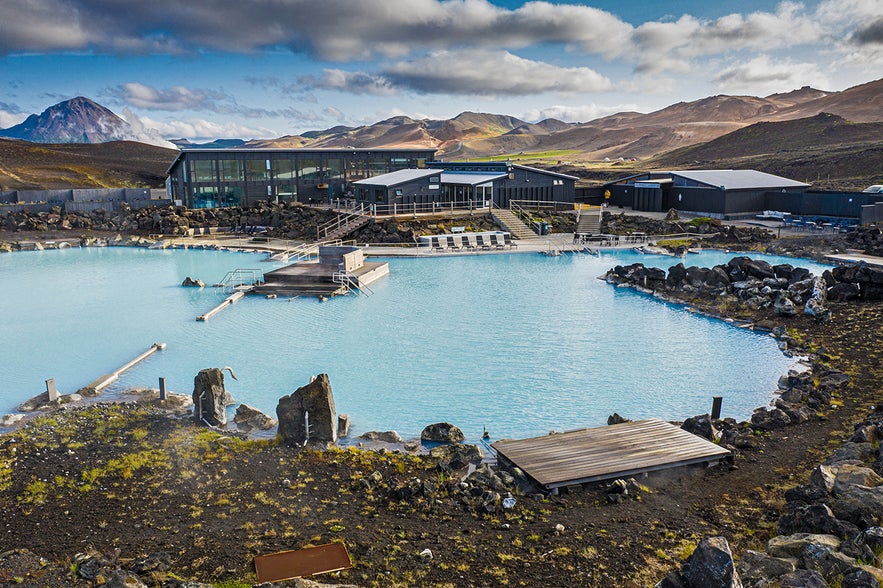 Another lagoon similar in texture and has the same blue color as the Blue Lagoon is the Myvatn Nature Baths. The baths are North Iceland's answer to the South's famous spa, and it's just as appealing.
Another lagoon similar in texture and has the same blue color as the Blue Lagoon is the Myvatn Nature Baths. The baths are North Iceland's answer to the South's famous spa, and it's just as appealing.
The Myvatn Nature Baths are a cheaper alternative and have become the preferred option for those who still crave that milky blue water but feel that the Blue Lagoon may have become a little too popular.
The one thing preventing some people from going to Myvatn is how far it's from Reykjavik. Myvatn Baths are 288 miles (465 kilometers) from the capital city, so these Iceland baths only suit those on longer journeys who plan to visit the northern part of Iceland. There are, however, some very nice accommodation options in Myvatn, so those who make the trip will enjoy a wonderful stay among beautiful nature.
On-site, you'll find a good shower and changing facilities, as well as a sauna and a cafe where you can grab some refreshments before or after your soak.
As a plus, the surrounding nature is stunning, making a trip to Lake Myvatn well worth the journey any time of year.
5. Vok Baths
Photo from Admission to the Serene Vok Baths of East Iceland near Egilsstadir
Vok Baths stand out among spas in Iceland, as the warm pools of geothermal water float on a freshwater lake. Located in East Iceland, Vok Baths beautifully incorporates its environment into the spa's design, making you feel like you're bathing in nature.
Geothermal heat, which is not common in East Iceland, was discovered in Lake Urridavatn when locals noticed that certain parts of the lake did not freeze over during winter. For the longest time, these spots were used for washing clothes when it was difficult to find water during Iceland's coldest period of the year.
However, in 2019, Vok Baths opened with the goal of using the geothermal source for bathing while still keeping that special connection to nature, making the design fit seamlessly into the area.
The spa features two floating infinity pools, an inside pool, a steam room, an in-water bar, and a bistro that serves light courses for adults and kids. Additionally, there is Lake Urridavatn, which guests are free to hop in, while visiting the spa. The lake has exceptionally clean water, and there's no better feeling than going from swimming in the cold lake to soaking in the warm geothermal pools.
The geothermal water in eastern Iceland is unique because it's the only naturally warm drinkable water in Iceland. It runs out of the tap at 165 F (75 C) and is used to brew teas with a selection of organic and locally sourced herbs, which guests can enjoy while visiting the facility. Book your Vok Baths admission now so you don't miss out on the experience!
6. Forest Lagoon
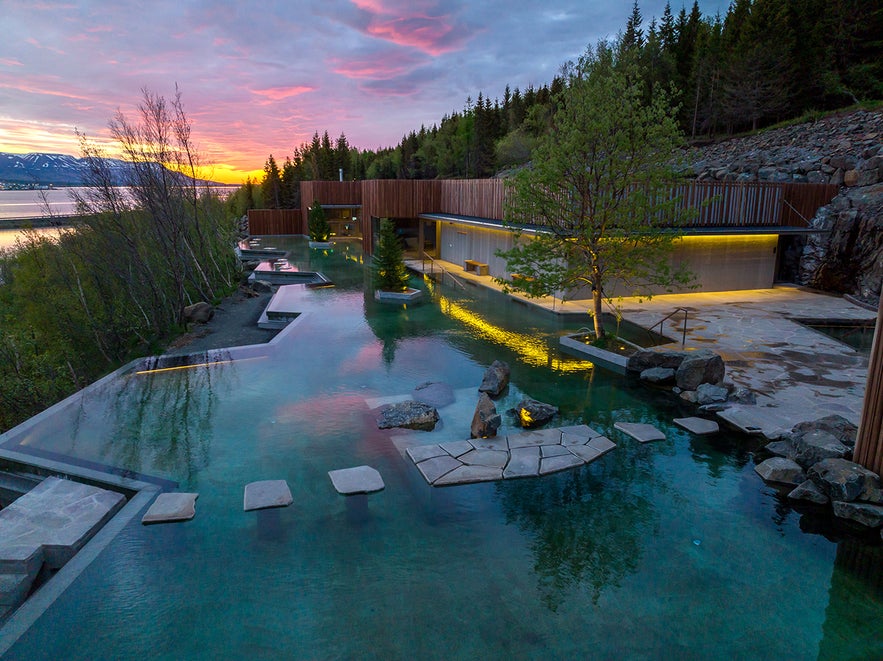 Opened in 2022, the Forest Lagoon is the newest edition to the array of geothermal spas in Iceland. Located in North Iceland, these outdoor baths are located in the forest of Vadlaskogur, with the lagoon surrounded by trees and foliage.
Opened in 2022, the Forest Lagoon is the newest edition to the array of geothermal spas in Iceland. Located in North Iceland, these outdoor baths are located in the forest of Vadlaskogur, with the lagoon surrounded by trees and foliage.
In addition to the surroundings, wooden elements are also incorporated into every area of the spa. The architecture firm behind the Forest Lagoon is the same as designed the Blue Lagoon, so you can expect the same type of care and attention to detail as in Iceland's most popular geothermal spa.
The two infinity pools at the spa overlook the fjord of Eyjafjordur, giving you great views of Akureyri and the surrounding area. The spa also includes two in-water bars, a sauna, a quiet room, a cold tub, and a restaurant on-site to dine at after a long warm soak in the geothermal waters.
The Forest Lagoon has the benefit of having long opening hours, opening at 10 in the morning and remaining open until midnight. Therefore, visitors can have a long day of hiking or skiing in the area and still have time to relax and decompress at the lagoon after a long day.
7. GeoSea Sea Baths
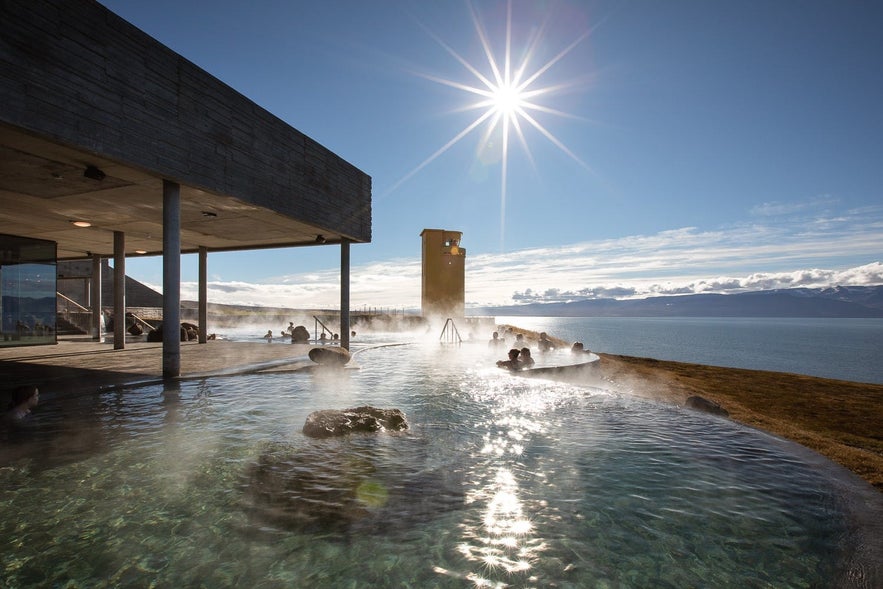 Photo from Admission to the Relaxing Geosea Geothermal Baths in Husavik
Photo from Admission to the Relaxing Geosea Geothermal Baths in Husavik
The Geosea Sea Baths are one of the newest attractions in North Iceland, located in the town of Husavik (often regarded as the whale-watching capital of Europe).
As can be gathered from the name, the water here is unique, as it's geothermally heated seawater rather than spring water leading to an exfoliating Iceland salt bath. The water is filled with salt and a host of healing minerals, quite different from those in other pools and hot tubs around the country.
This water is pumped up from two nearby holes in the ground, creating a constant flow through the pools, meaning no chemicals need to be added for hygiene reasons.
The Geosea Sea Baths offer incredible views over the beautiful Skjalfandi Bay, with its glistening ocean and the beautiful mountains that frame it.
There's also a small restaurant on-site with an outdoor terrace, allowing you to enjoy the seascapes with some light refreshments and modern changing facilities.
8. Fontana Geothermal Baths
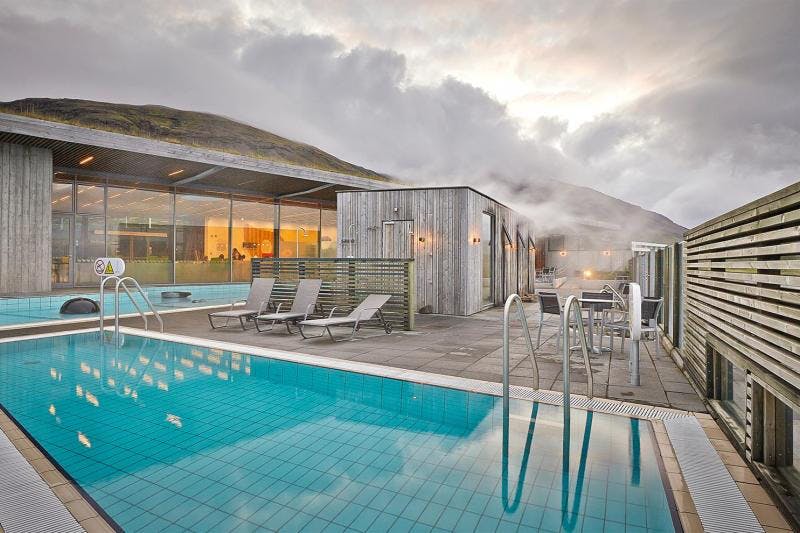
Fontana Geothermal Baths are located next to Laugarvatn Lake, about 48 miles (78 kilometers) from Reykjavik.
It's conveniently located near the Golden Circle, making it a great addition to your trip along the famous route.
The Laugarvatn area sits over a hot zone. People in the namesake village have been using hot water from the ground for heating their houses, cooking, and bathing since 1929.
One of the saunas at the Fontana Baths is the same one used in the past, although it's since been renovated. The sauna was built over a steaming hot spring, and if it gets too hot inside, guests simply need to open the door to cool it down.
Adventurous guests can also wander down to Laugarvatn lake itself to cool off, even in the wintertime, as the lake is geothermal.
The sand between the baths and the lake is warm due to this activity, and in places, it's warm enough to cook traditional rye bread by burying the dough in the sand.
You can taste bread that has been freshly baked in the ground at the cafe located at Fontana Spa's entrance.
9. Krauma Spa
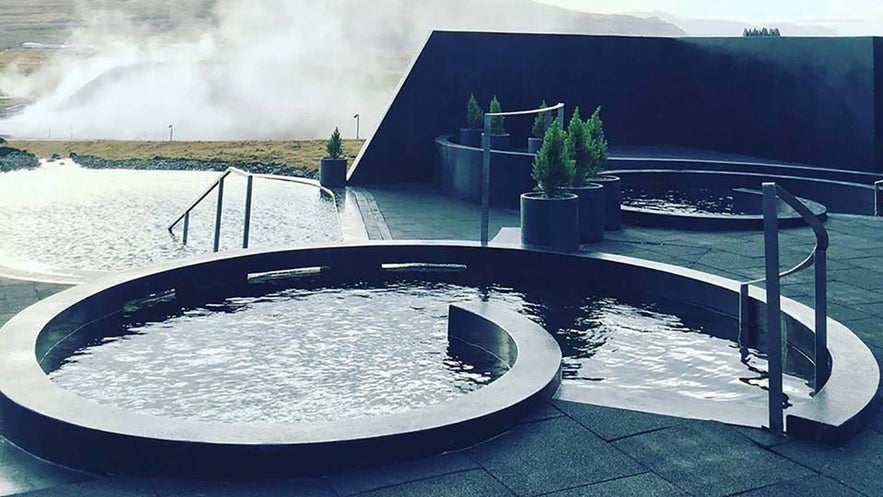 Photo from Unique 9-Hour Minibus Tour of West Iceland & Krauma Spa with Transfer from Reykjavik
Photo from Unique 9-Hour Minibus Tour of West Iceland & Krauma Spa with Transfer from Reykjavik
Krauma Spa opened in late 2017 and quickly became a popular destination in West Iceland.
This modern location is next to Europe's most powerful hot spring, Deildartunguhver, where the hot water is sourced from. However, as Deildartunguhver is nearly boiling, the water at Krauma must be cooled down using pristine fresh glacial water.
You can relax in six beautiful black marble tubs, with a view towards the seething Deildartunguhver, or enjoy the soothing saunas on the premises.
Five of these tubs are warm with varying temperatures, while one is cold, 41-46 F (5-8 C), excellent for boosting your blood circulation. There are showers, changing facilities, and a restaurant on-site if you're ready for a great meal after soaking in the warm water.
A visit to Krauma Spa is undoubtedly one of the best ways of unwinding in West Iceland.
10. Bjorbodin Beer Spa
Photo from Unforgettable 1-Hour Bjorbodin Beer Spa Tour in North Iceland
For a spa with a twist, why not try bathing in beer at the Bjorbodin Beer Spa at the Kaldi brewery in Arskogssandur in North Iceland?
Here you can enjoy the views of Eyjafjordur fjord and the island of Hrisey island with a cold one in your hand, soaking in hoppy, warm beer! The warm beer is said to do wonders for your skin, and after a good soak, you tuck in at a relaxation area.
This spa is the odd one out on the list as it's not a sprawling facility located in a natural environment under the sky. But what it lacks in scale, it makes up for in uniqueness.
The beer is at its early fermentation stage when you bathe in it, so it has a very low pH level, which is said to tighten and soften your hair follicles and cleanse your skin. Afterward, you will feel very soothed and relaxed, and it's recommended not to shower 3-5 hours after the bath to allow the body to revitalize.
You can book your entry to the Beer Spa and plan for a unique soak you'll not soon forget!
Top 5 Best Geothermal Pools in Iceland
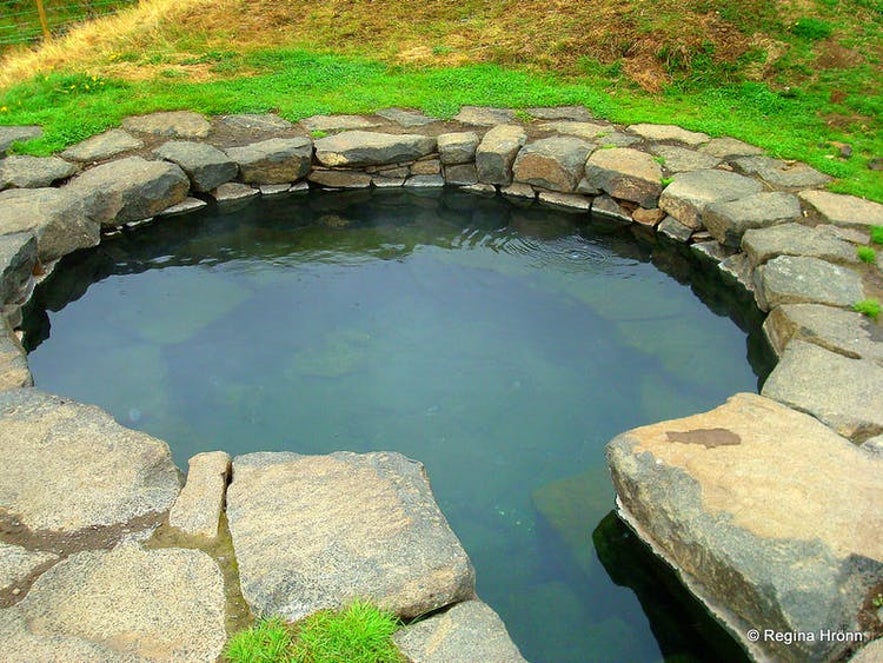 Photo by Regína Hrönn Ragnarsdóttir
Photo by Regína Hrönn Ragnarsdóttir
Besides all the human-made, concrete swimming pools with showers and bathroom facilities you can find around Iceland (some of which are truly spectacular such as the infinity pool at Hofsos), several are a cross between a human-made pool and a geothermal hot spring.
The water might be all-natural, but someone needed to pile up some rocks or make a concrete structure around it for people to enjoy the place as a bathing location.
To reach these places, you need to rent a car in Iceland as these are often in rural locations, a little hard to get to, and may or may not offer some changing facilities.
1. Secret Lagoon
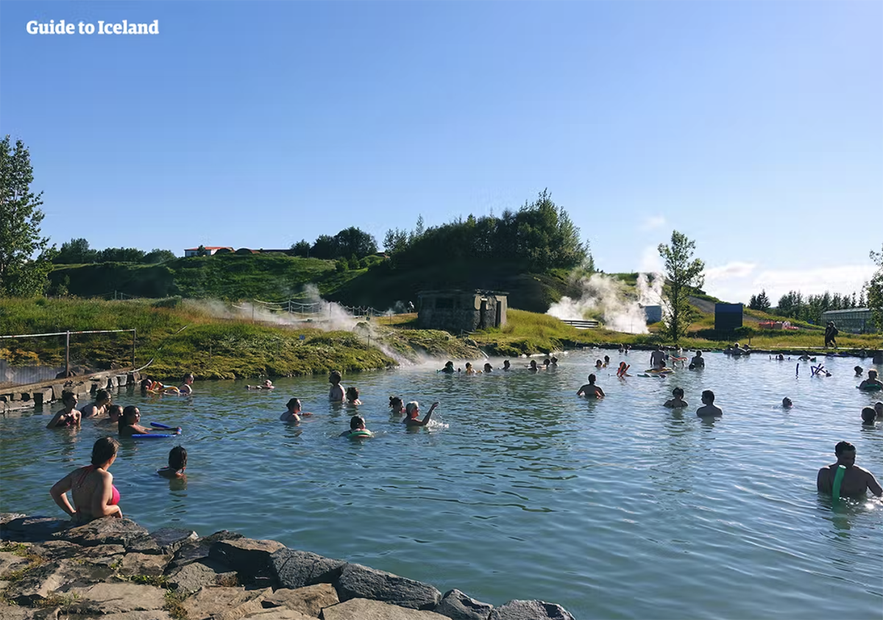
It lay abandoned for decades and fell into disrepair but was renovated and reopened in 2014 with brand new facilities, including showers and a bistro that serves light meals and drinks.
The pool is a comfortable 100-104 F (38-40 C), making it feel like a large hot tub. It's located near the popular Golden Circle, making it a great place to stop before or after visiting this popular sightseeing route. You can even enjoy both during this Golden Circle and Secret Lagoon hot spring tour.
Aside from being a fantastic spot to take a dip, the scenery surrounding the Secret Lagoon is well worth the visit. Right next to it are bubbling hot springs, steaming fumaroles, and even a small geyser that erupts every few minutes. Make sure to book your Secret Lagoon admission ahead of time.
2. Seljavallalaug
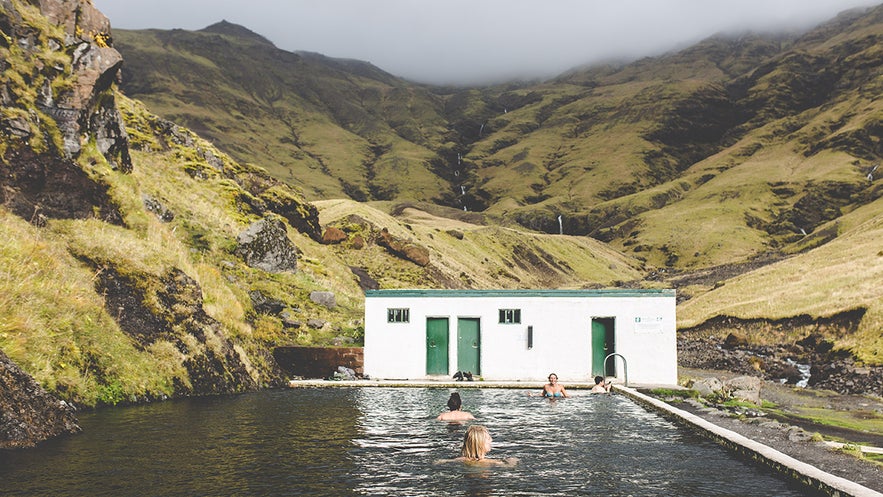 Photo by Tim Wright, from Wikimedia, Creative Commons. No edits made.
Photo by Tim Wright, from Wikimedia, Creative Commons. No edits made.
Seljavallalaug is on the South Coast of Iceland, between the waterfalls Seljalandsfoss and Skogafoss.
Although this is a human-made 82-foot (25-meter) long and 33-foot (10-meter) wide construction from 1923, its surroundings make you feel like you're in the middle of nowhere.
The geothermal water that trickles into the water comes from the ground, and the pool is built into a mountainside that acts as its fourth wall. The water isn't very hot, and it's only lukewarm in wintertime, but on summer days, it's perfect.
Seljavallalaug has two small rooms where people can leave their clothes. Please leave these as tidy as possible as they're only attended to by volunteers very infrequently.
The water in the pool is also only cleaned once every summer. So depending on when you go, it may look a bit dirty. But the tranquility and beauty around the pool make up for a bit of a natural Iceland mud bath.
In 2010, Seljavallalaug was completely covered with ash from the giant eruption in the Eyjafjallajokull glacier. A large group of volunteers spent days cleaning and restoring the pool to its former state.
The pool is 93 miles (150 kilometers) from Reykjavik. To get there, you just need to head south on the main Ring Road, past Selfoss and Hvolsvollur. Slow down before you reach Skogafoss and turn left to go towards 'Seljavellir' on a dirt road. Then it's about a 10-15 minute walk along a gravel track to the pool itself.
3. Krossneslaug
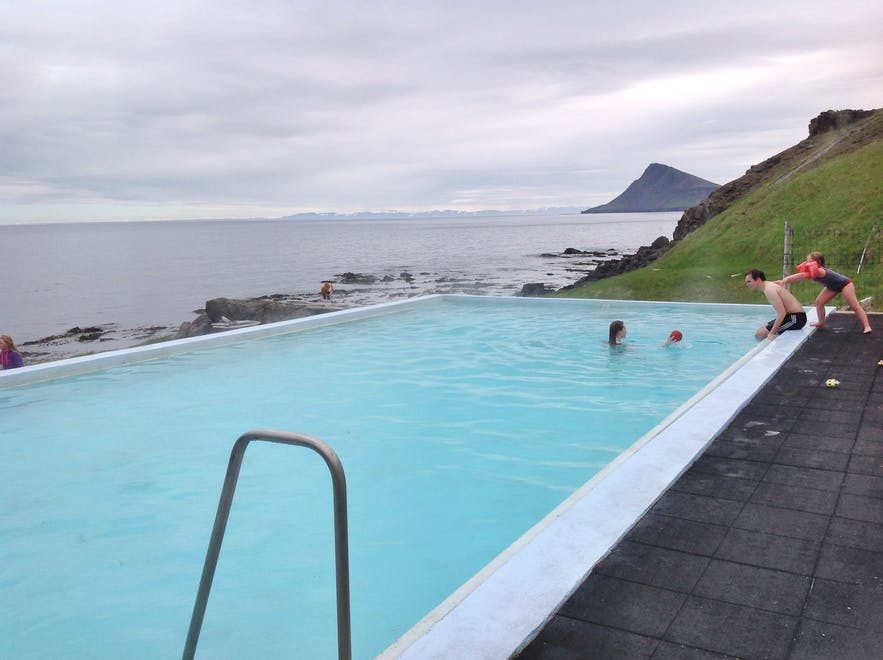 Photo by Alda Sigmundsdóttir
Photo by Alda Sigmundsdóttir
At the end of Road 643 on the eastern coast of the Westfjords, you'll find the stunning Krossneslaug pool.
Warm water from Icelandic hot springs in the nearby mountains flows into the pool, and there's also a slightly warmer hot tub to the side of it.
The pool has simple changing and showering facilities and an honesty bucket where you can pay 500 ISK (about $3.50) for entry and keep the facilities clean.
Despite the long drive on a gravel road to reach it, this pool is loved by its visitors because of its fantastic views and the feeling it provides of being at the edge of the world.
4. Hreppslaug
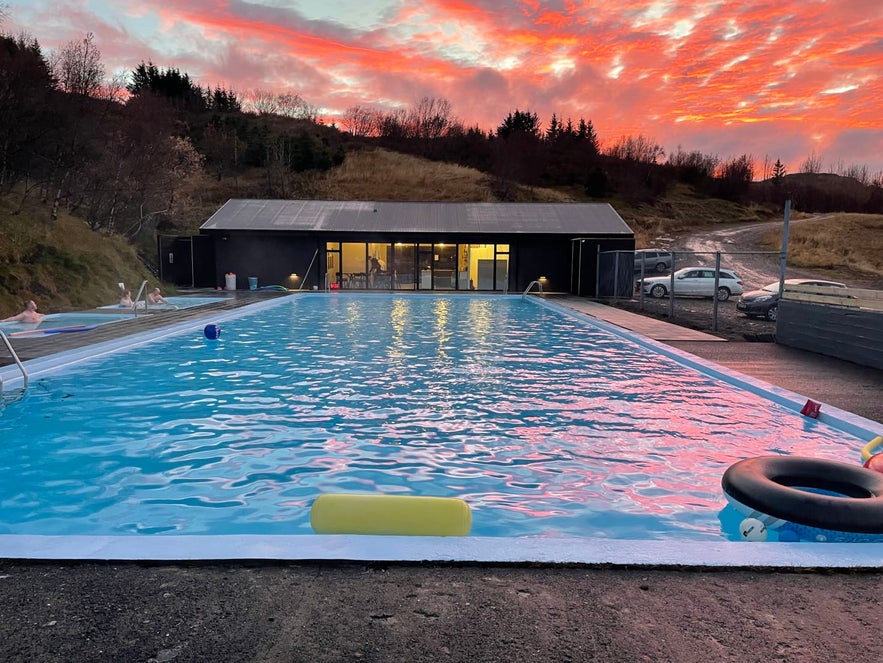
This historic pool is protected by the Cultural Heritage Agency of Iceland, and efforts have been made to preserve its original design and function.
In the summer of 2022, the President of Iceland, Gudni Th. Jóhannesson, visited Hreppslaug to ceremonially open the newly built facilities at the pool, including a new reception area, changing rooms, and showers. There are also two hot pots in the area, which have been newly renovated, and a snack bar.
This is an example of a real countryside pool that is run by volunteers and has a certain authentic charm that larger-scale luxury spas can't compete with.
5. Hljomskalagardur Wading Pool
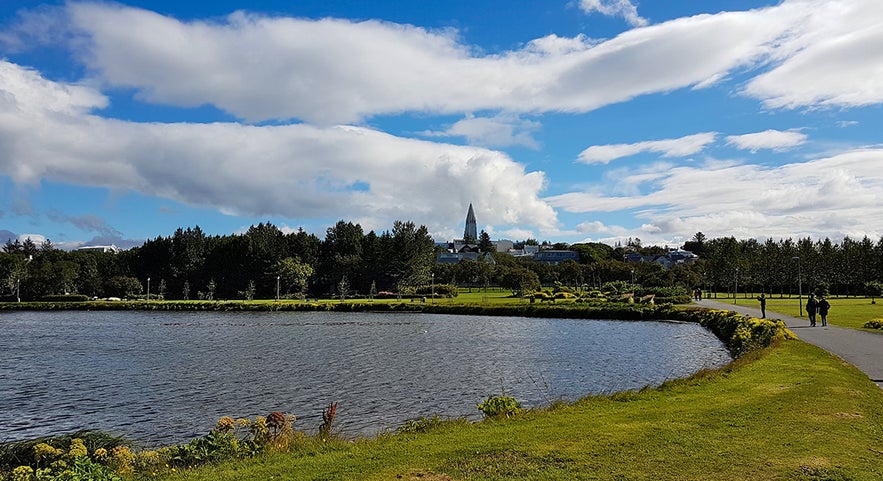
Photo by Jan Ainali, from Wikimedia Creative Commons. No edits made.
This geothermal pool in Iceland is different from the others on this list as it is not located in some remote area in the countryside but right in the heart of Reykjavik's city center.
Located in Hljomskalagardur public park, right by Lake Tjornin, this wading pool is only about a foot deep (30 cm). That makes it perfect for a nice foot bath for adults or for kids to splash around on a warm sunny day.
How this pool came about is an interesting case of direct democracy. The pool was constructed after an open referendum was held on the Reykjavik City Hall's website in 2016, where citizens could vote on what city projects they most wanted to see constructed in their city. The wading pool got the most votes and therefore, it was built the following year.
It has become popular among families with young children during the summer, as its easily accessible and conveniently located. During the winter, the water of the pool is emptied out.
Top 5 Hot Tubs in Iceland
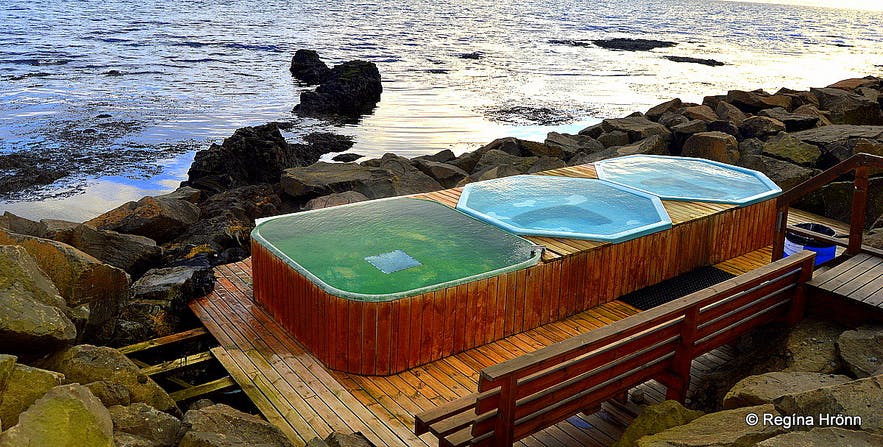 Photo by Regína Hrönn Ragnarsdóttir
Photo by Regína Hrönn Ragnarsdóttir
You've read about the thermal pools in Iceland, but there are also hundreds of scenic hot tubs in Iceland.
Each public swimming pool in Iceland boasts at least one hot tub. There can be up to six or seven hot tubs in some cases, and they're also common in private residences and hotels.
If you'd like a private hot tub, then you could look into renting a remote summer cabin. A large percentage of Icelandic summer cabins come with a hot tub.
The following list contains the best human-made tubs to visit. They're in spectacular settings, often with views of impressive mountains or the enchanting sea.
1. Drangsnes Hot Tubs
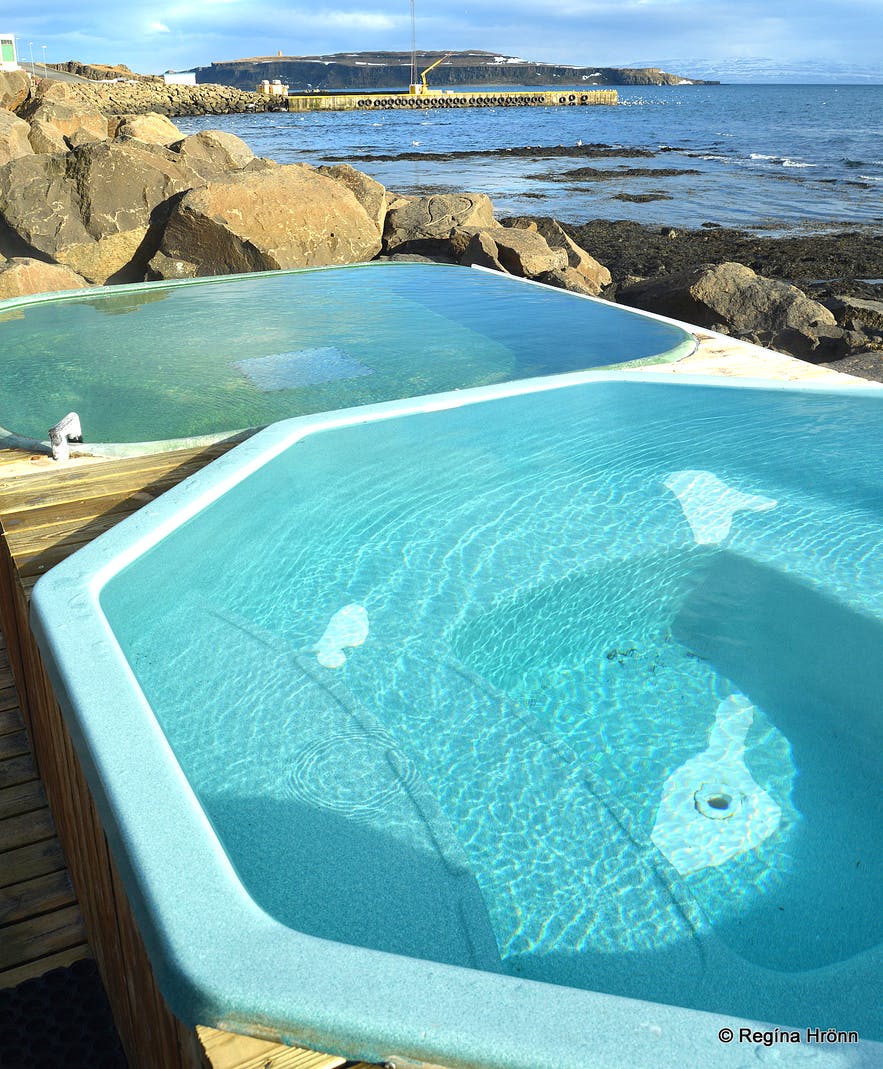 Photo by Regína Hrönn Ragnarsdóttir
Photo by Regína Hrönn Ragnarsdóttir
In the center of the small town of Drangsnes in the Westfjords, you'll find three hot tubs right by the seaside. These tubs have free entry, and you can go there any time of the day or night.
The temperature varies from one hot tub to the next, but they're between 100-107 F (38-42 C).
Across the road is a small changing facility, and you'll be sure to meet some friendly locals once you get into the tubs.
And if it gets too hot, you can simply cool off in the sea nearby. Just be careful of the rocks.
2. Gudrunarlaug
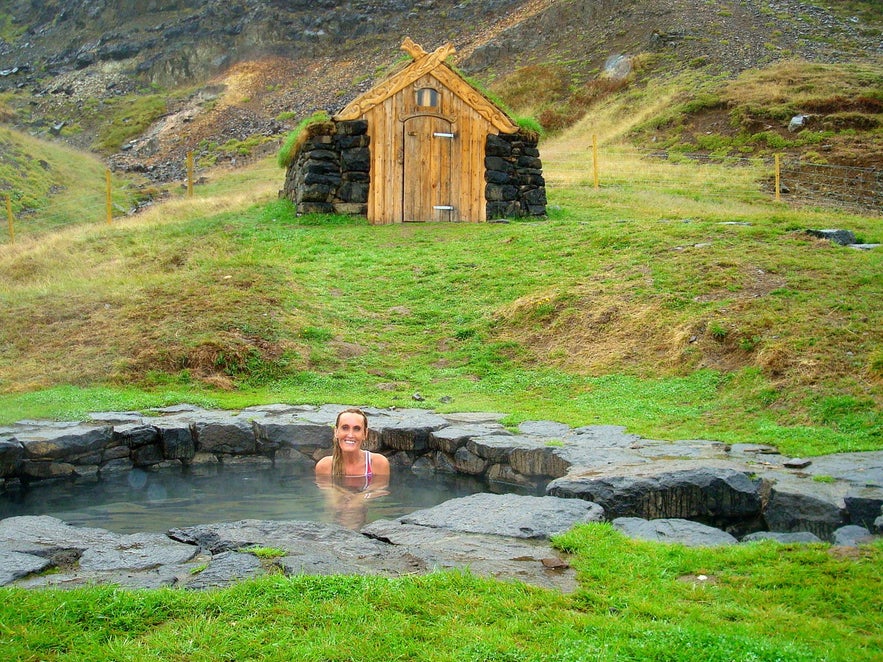
Gudrunarlaug is a reconstructed historical hot pool named after Gudrun Osvifursdottir, one of the prominent women of the Icelandic Sagas. This is what a hot tub would look like during the settlement era and thus gets to be included in this list.
These thermal baths in Iceland have existed for over a thousand years but were blocked by a landslide for 140 years. The pool was reconstructed and built like a replica of the original pool. It was opened in 2009 to the delight of visitors.
Gudrunarlaug is in West Iceland, on the way to the Westfjords. Nearby to the pool is Hotel Laugar Saelingsdal and the Laugar campsite. You can also visit the Church of the Elves, which is located close to the pool, and have yourself a full day of Icelandic history and folklore in the West!
To reach it you have to rent your own car as no scheduled buses or tours go here.
Head north from Reykjavik on the Ring Road, turn into Road 60 towards the Westfjords, and turn left onto Road 589 until you reach the hot spring.
Entry is free, and there's a small changing room on site. To preserve this piece of Icelandic history, please tidy up after yourself and treat the area with respect.
3. Nautholsvik
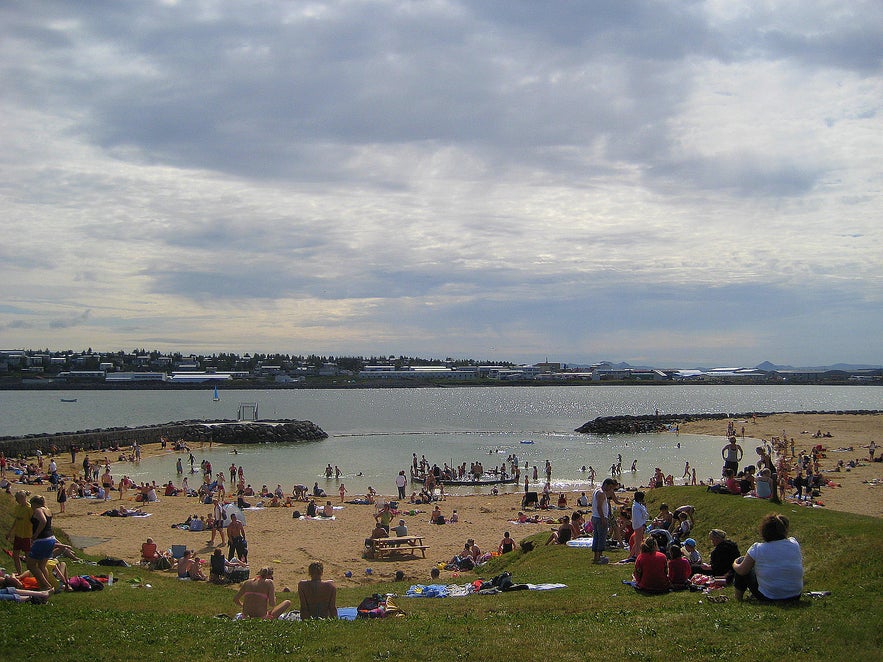 Photo from Wikimedia, Creative Commons, by Helgi Halldórsson. No edits were made.
Photo from Wikimedia, Creative Commons, by Helgi Halldórsson. No edits were made.
Besides the numerous swimming pools and hot tubs you can find within the capital region, there's also the city's geothermal heated beach Nautholsvik. It's another fantastic budget activity to check off in Reykjavik.
Here you'll find both a hot tub at the edge of the seawater as well as a broader but shallower warm pool by the changing facilities.
Next to the changing facilities are bathrooms, showers, a sauna, and a small cafe.
The water in the hot tub by the sea varies in temperature, from 86-102 F (30-39 C), but the shallower pool is a constant 100 F (38 C).
Even the sea right by the beach is heated here during the summer months and is about 59-66 F (15-19 C) within the rock fence.
Entry is free throughout the summer months. In winter, the opening times are shorter, and a small fee applies to the changing facilities.
4. Hoffell Hot Tubs
There aren't many famous hot springs in Iceland in East Iceland, but the Hoffell hot tubs are one option.
The tubs are all neatly submerged in a bed of rocks, and the views of the surrounding snow-capped mountains are spectacular.
There are four different hot tubs located right next to each other. There's a small entry fee, but those staying at the nearby Glacier World accommodations can take a dip for free.
The hot tubs are situated 12.5 miles (20 kilometers) west of the town of Hofn in East Iceland. Turn from the Ring Road onto Road 984 towards Glacier World Guesthouse to reach them.
5. Kvika Foot Bath
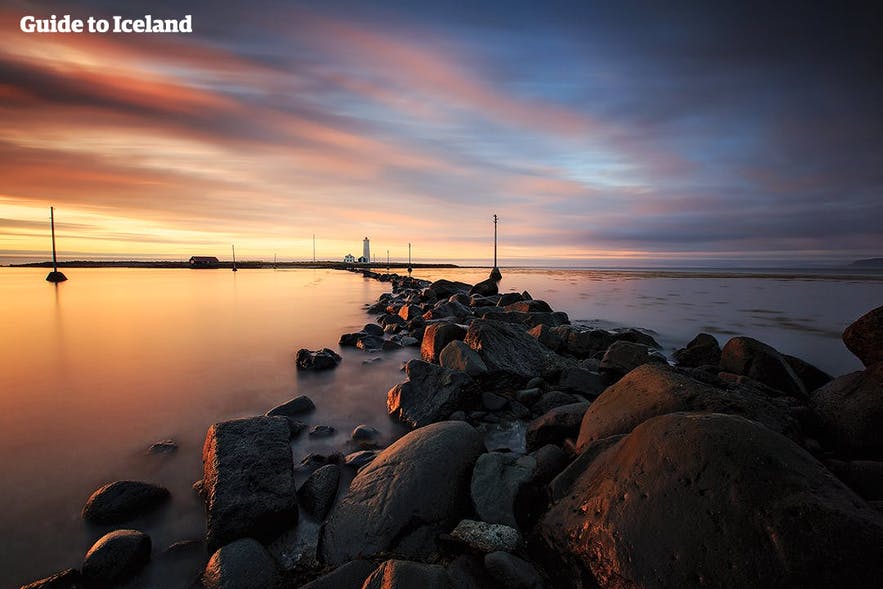
Found near the Grotta lighthouse in the greater Reykjavik area is the footbath Kvika. You can view it as a type of hot tub... for your feet!
Artist Olof Nordal designed this human-made hot spring, and it sports one of the best views in town, looking over the mountain Esja and the mighty Snaefellsjokull glacier.
Olof carved a small bathing pool, about 30-35 inches (80-90 centimeters) wide and 10-12 inches (25-30 centimeters) deep, into a large rock.
The constant trickle of warm water comes from a nearby borehole and is cooled down to around 102 F (39 C).
Both Kvika and the Grotta lighthouse are popular locations for locals to watch the sunset or the northern lights. The view makes it one of the great places to visit hot springs in Reykjavik.
However, please note that while there are no changing facilities in the area, as Kvika is only designed as a footbath, entry is free.
Top 5 Natural, Free Hot Springs in Iceland
What about the best hot springs in Iceland, where there's no entry fee?
To get an idea of their differences, read about these five natural hot springs in Iceland, but keep in mind that there are several others that exist, some more inaccessible than others.
You can reach these hot springs by joining a hot spring tour or renting a car and driving there yourself.
1. Reykjadalur: An Icelandic Hot Spring Thermal River
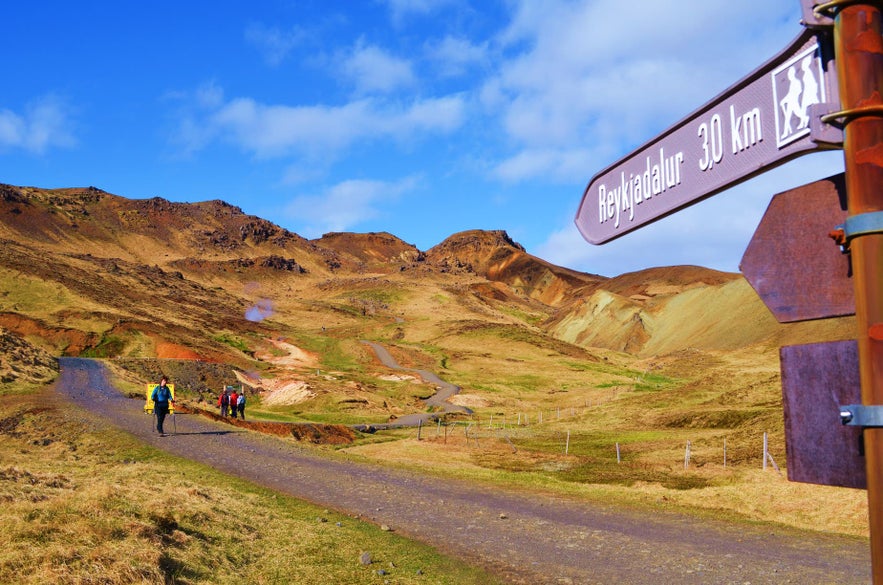 Photo from Relaxing 4-Hour Reykjadalur Hike and Hot Spring Tour with Pick-up in Reykjavik
Photo from Relaxing 4-Hour Reykjadalur Hike and Hot Spring Tour with Pick-up in Reykjavik
Reykjadalur (which translates to "Steam Valley") is one of the most accessible hot spring areas to reach from Reykjavik.
The town of Hveragerdi is 28 miles (45 kilometers). From there, you can hike up to the warm river that flows down the Reykjadalur valley.
The hike is not very demanding, although it's mostly uphill. The path is not recommended for people that are afraid of heights since you'll be hiking along the top of a deep gorge at one point.
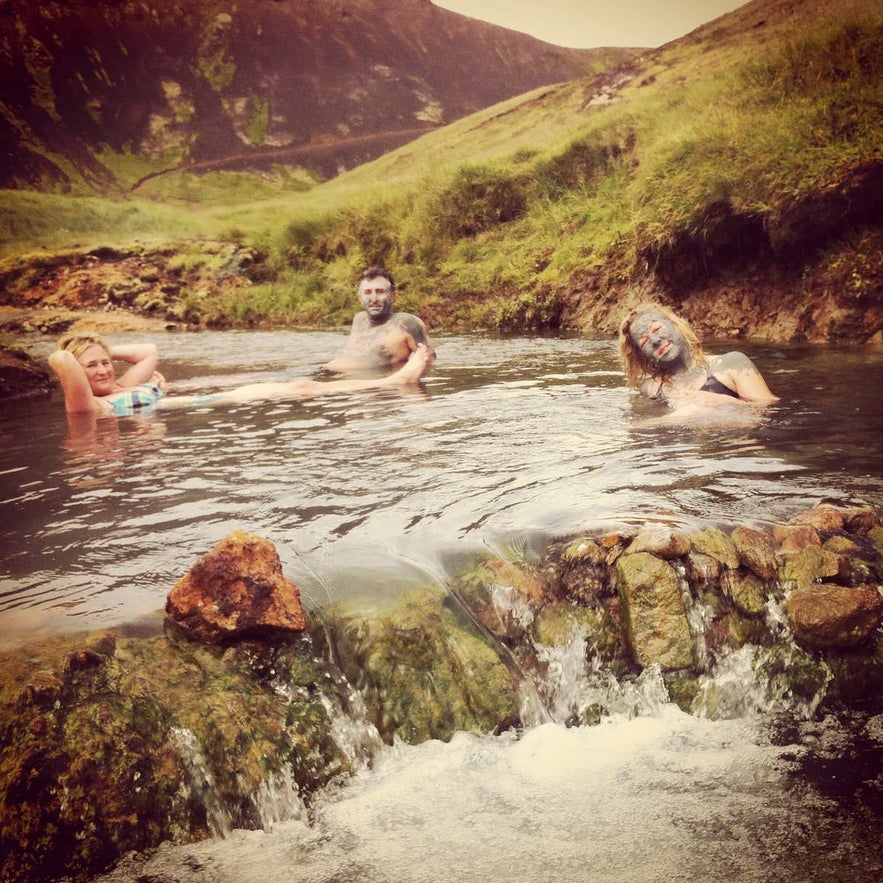 Photo from Relaxing 4-Hour Hike to Reykjadalur Valley With Hot Spring Tour from Hveragerdi
Photo from Relaxing 4-Hour Hike to Reykjadalur Valley With Hot Spring Tour from Hveragerdi
If you are in good shape and don't make many stops along the way, you should reach the thermal river after 45-60 minutes. However, the hike could take up to 90 minutes one way.
The duration depends on how fast you walk and how often you stop to take pictures of the waterfall in the gorge and all the pretty bubbling muddy hot springs on the way.
There are no facilities for changing your clothes when you get up there. Bathing in the unspoiled nature under the sky makes it one of Iceland's most natural and best hot springs.
You can reach the river on this Reykjadalur hot spring hiking tour.
2. Hellulaug
Photo by Regína Hrönn Ragnarsdóttir.
You can find Hellulaug in the Westfjords, just about 550 yards (500 meters) east of Hotel Flokalundur.
If you are crossing Breidafjordur fjord with the ferry Baldur, perhaps making a stop at Flatey island, this hot pool is only 3 miles (5 kilometers) from Brjanslaekur, where the ferry docks.
The pool is not seen from the road but is right next to it. The water is a comfortable 100 F (38 C), and the pool is about 24 inches (60 centimeters) deep. You can always cool down in the sea if you get too hot, which isn't far off! Keep in mind that there aren't any changing facilities, bathrooms, or showers in the area.
3. Landmannalaugar
Photo by Julien Carnot, from Wikimedia Commons. No edits made.
Landmannalaugar is an area in the Icelandic Highlands known for its stunning multi-colored landscape and popular hiking destination.
You'll see sandy mountains in red, blue, green, yellow, purple, and black everywhere you look. After an exhausting day of hiking, the best thing is to relax in the hot geothermal pools that are waiting for you next to the campsite.
The thermal pools stay consistently warm throughout the summer and have a steady stream of hikers relaxing in them. It's the perfect oasis in the highlands.
Take note that some parasites have been found in these pools in the past, but they're considered harmless.
However, if you are allergic to mosquito bites, you should abstain from entering the pools.
Landmannalaugar is only accessible during the summertime and only with a four-wheel-drive vehicle.
You'll need to cross some rivers to get there, so if you're not used to driving in the highlands, you may want to take a bus or go on a super jeep tour to get there.
If you drive yourself, then go carefully and make sure you cross rivers where they're at their widest (as they're deeper and run faster where they're narrow). Ask other drivers you meet where it's best to cross, as the rivers are constantly changing.
If you're short of time, Landmannalaugar can even be explored in a day. It remains one of the most epic places to explore in Iceland's stunning highlands.
4. Laugavallalaug
Here you'll find not just a natural hot spring to bathe in but a natural hot waterfall as well! Laugavallalaug is situated high in the eastern highlands, so this natural pool is more challenging to reach than others.
You'll need a sturdy car to get near it as you need to drive up a 4.2-mile (7-kilometer) F-road that's only passable for four-wheel-drive vehicles. Then there's a short 600-foot (200-meter) walk to reach the pool.
Alternatively, you can drive a two-wheel-drive car to Karahnjukar dam, then hike alongside Hafrahvammar canyon to the warm waterfall. The hike takes around seven hours (with time for bathing included).
There are also two very nice natural pools, with a circular stone wall at the highland cabin Laugarfell that isn't too far away and is easier to reach. It's the perfect place to spend the night when exploring the area.
Super Jeep tours and hiking tours operate from here or from the nearby town of Egilsstadir.
5. Viti in Askja
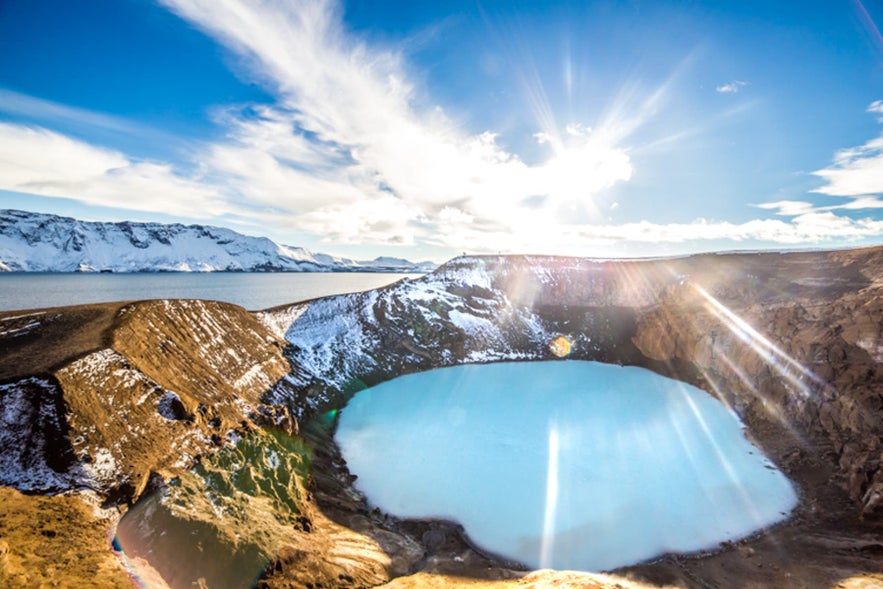 Photo from Fantastic 12-Hour Super Jeep Tour to Askja Caldera & Holuhraun Lava Field with Transfer from Myvatn
Photo from Fantastic 12-Hour Super Jeep Tour to Askja Caldera & Holuhraun Lava Field with Transfer from Myvatn
Also, in the eastern part of Iceland and relatively close to Laugavallalaug, visit the Viti crater in Askja, which is not to be confused with Viti in Krafla. The name 'Viti' literally translates to hell. It acquired that name because it was formed after a hellish volcanic eruption in 1875, which devasted the region.
The water temperature in Viti is around 85 F (30 C) but can be scalding hot in the east part of the crater, so visitors need to be careful where they submerge themselves in the water.
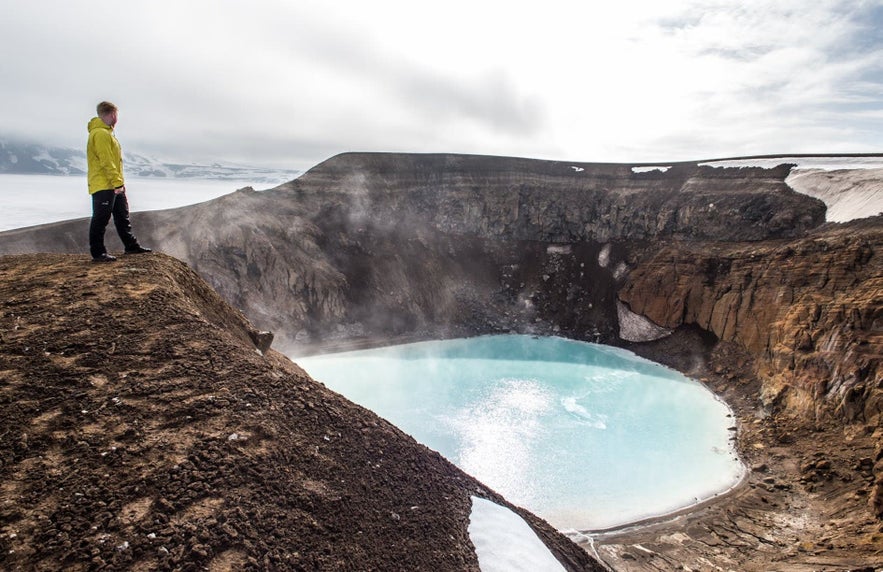 Photo from Fantastic 12-Hour Super Jeep Tour to Askja Caldera & Holuhraun Lava Field with Transfer from Myvatn
Photo from Fantastic 12-Hour Super Jeep Tour to Askja Caldera & Holuhraun Lava Field with Transfer from Myvatn
The bottom of the crater is muddy, and there's also a high amount of sulfur in the water, creating steam that can cause people to faint.
But the place has been described as one of the most magnificent spots in Iceland. Whoever stands on the edge of this crater will never forget the experience!
Top 5 'No Bathing' Hot Springs & Pools in Iceland
If you are unfamiliar with hot springs, it may be hard to tell the difference between those that are safe to enter and those that are not if there are no warning signs.
There are plenty of hot springs, pools, hot tubs, and geysers in Iceland, both natural and human-made, that you should not attempt to bathe in.
Most of the time, this is because it's simply too dangerous, either because the water is too hot, too unstable, or too cold.
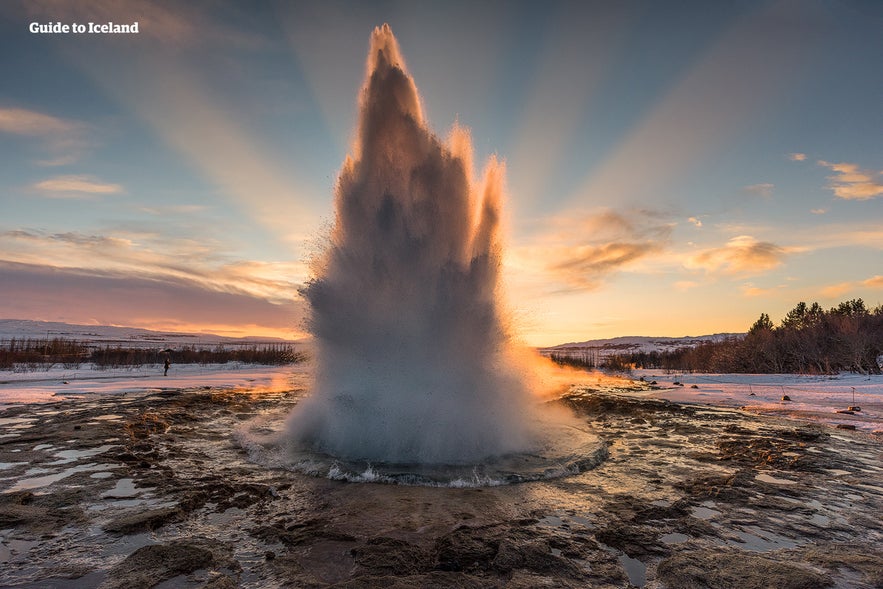
It should go without saying that any hot spring with large boiling bubbles is too hot to enter.
These hot springs are fenced off in the most famous geothermal areas and will have a warning sign telling you to be careful. However, that may not be the case with all hot springs in Iceland.
1. Geysir
Although it has remained dormant for a few years, Geysir still contains boiling water far too extreme to enter.
Geysir's geothermal area has smaller geysers, including the famous Strokkur, which erupts every few minutes.
Several steaming pools and springs look incredibly alluring on a cold winter's day.
As Geysir is one of the most frequently visited areas in Iceland, being part of the popular Golden Circle, these hot springs are all fenced off. When visiting there, you'll find warning signs detailing that they're up to 212 F (100 C) hot.
However, in the year 2000, Geysir erupted unexpectedly. A large gathering of people that had been standing nearby had to run for their lives, and the water burned several peoples' feet and legs.
The land surrounding the geysers can also be extremely hot, so people are asked to keep to the designated path so their feet do not sink into the burning mud.
It's always wise to be careful in any geothermal area you may visit in Iceland.
2. Grjotagja
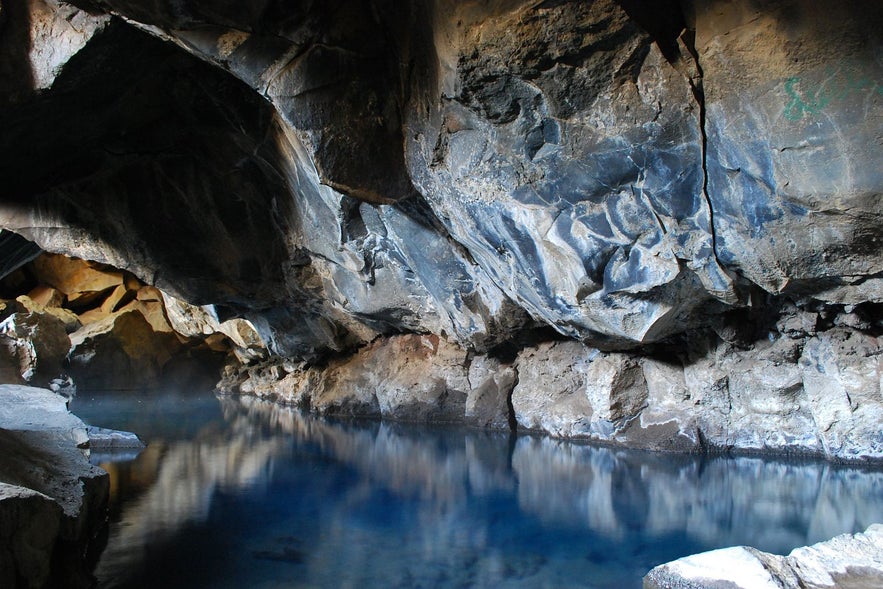 Photo from Wikimedia, Creative Commons, by Chmee2. No edits were made.
Photo from Wikimedia, Creative Commons, by Chmee2. No edits were made.
Made famous worldwide in a steamy scene between Jon Snow and Ygritte from Game of Thrones, Grjotagja may look like the ideal place to take a warm bath. However, that's not the case.
The water temperature in Grjotagja varies, and it became too hot for swimming in the late 1970s (about 122 F or 50 C). It's been cooling down since, but it may still be too hot to bathe in, depending on the day and the recent earthquake.
Because of the water's varying heat, loose rocks in the cave, and the extremely slow water flow, it's now forbidden to bathe in the water.
Even if you can't swim in it, this site is worth seeing for its spectacular beauty. You can always go around the corner and bathe in Myvatn Nature Baths!
Grjotagja is located in North Iceland, so if you're staying in Akureyri, and want to explore the stunning nature around Lake Myvatn, then you're not far away from Grjotagja.
To get there, drive east from the village Reykjahlid (that's on the Ring Road) for a couple of miles, then turn right just before you reach the road to Myvatn Nature Baths.
3. Snorralaug
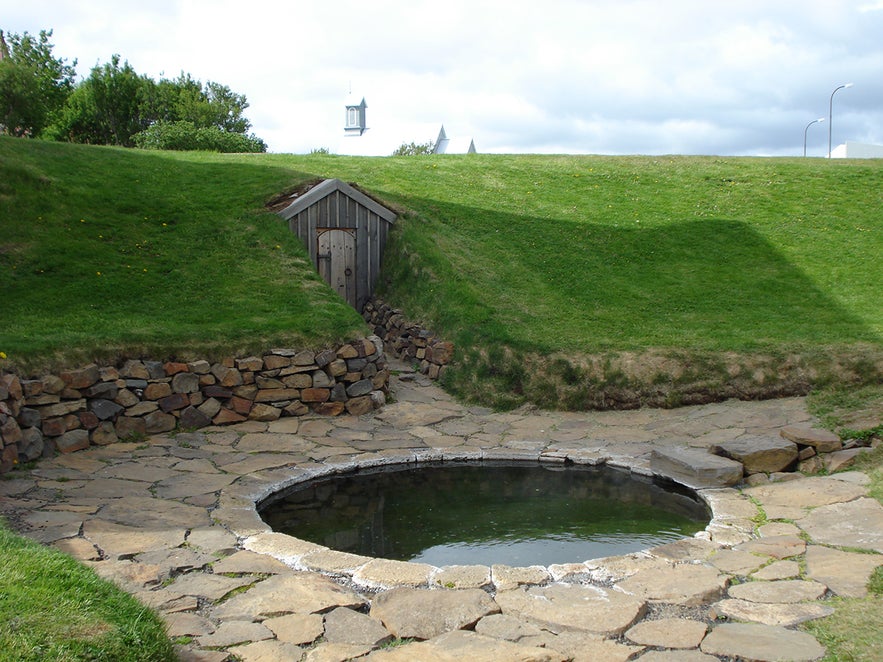 The Reykholt village in West Iceland is one of the most important historical locations in the country.
The Reykholt village in West Iceland is one of the most important historical locations in the country.
It's here where the great medieval historian, poet, and lawmaker, Snorri Sturluson, lived. Snorri is best known for having written the Prose Edda, one of the greatest work of European literature and an invaluable source for our knowledge of Norse mythology.
Just outside of his turf house, he had constructed his very own geothermal pool. The pool is one of Iceland's oldest structures, and since this is a historical location, bathing in the pool is forbidden. The water temperature varies, becoming extremely hot at times, so bathing there could also be dangerous.
The pool is small, only around 13 feet (4 meters) in diameter and 2.2-3 feet (0.7-1 meters) deep. Therefore, it would not handle the swarms of bathers and would quickly become dirty and unappealing for visitors.
However, visitors don't come here to bathe. They visit the nearby Snorrastofa museum and learn about history, Norse mythology, and the man who lent his name to the pool, Snorri Sturluson.
4. Blahver
Blahver looks like the ideal spring to bathe in, with its beautiful blue color, appearing calm and showing no signs of geothermal activity. You might think it would be great to take a photo of yourself relaxing in the azure waters of Blahver, but this hot spring is hiding deadly hazards.
Not only is Blahver scalding hot, meaning any bathing attempt will result in severe burns, but its edges are fragile and could break if walked on, making any escape attempts difficult.
Luckily, this hot spring, along with several others nearby in the geothermal area of Hveravellir near Lake Myvatn, is fenced off so guests can enjoy its beauty (and smell) from afar.
There's a lovely bathing pool close by, filled with naturally hot water from the area that has been cooled down.
5. Brimketill
This natural feature looks ideal for bathing, and some daredevils have entered its waters, as seen in the video above.
This clip was shot years ago (on a very calm and sunny day) before a ban on bathing was enacted due to this natural pool's hazardous surroundings.
Brimketill is not a hot spring, and its waters are far from being on the warm side. The Atlantic Sea is all you'll get here, which is cold enough to give people hypothermia if they stay in for too long.
The seawater continually sprays the slippery rocks and Brimketill is not a place you want to slip and fall.
On a beautiful, sunny day, the water may look appealing, but this area has strong winds, with towering waves crashing on the rocks most of the time. Sunny days in Iceland are few and far between.
Brimketill means 'Whitewater Cauldron,' due to the constant white rolling of the waves breaking on the surrounding rocks. The sight is impressive to see from a safe distance.
You can reach Brimketill by driving along the Reykjanes peninsula or joining a tour of the area.
FAQ About Hot Springs and Lagoons in Iceland
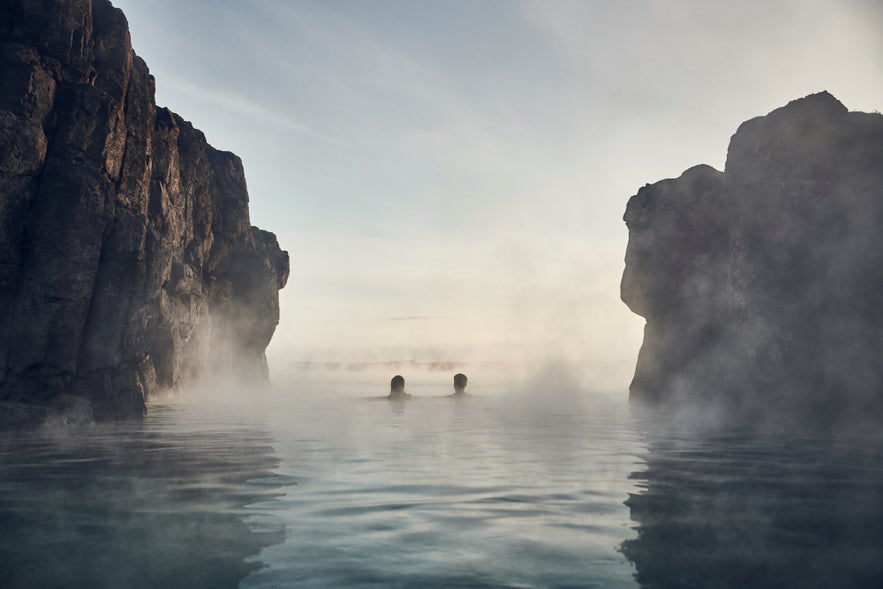
What are the benefits of soaking in a hot spring?
Hot springs in Iceland are popular for their relaxing and rejuvenating qualities. Soaking in these geothermal pools can improve blood circulation, relieve joint and muscle pain, and soothe skin conditions like psoriasis and eczema due to the silica and minerals in the water. While these benefits are widely appreciated, it’s always a good idea to consult your doctor if you have specific health concerns before visiting a hot spring.
Are there any hot spring resorts in Iceland?
Yes, Iceland has hot spring resorts where you can enjoy a luxurious geothermal experience. Examples include Krauma Geothermal Bath Resort, where you can soak in natural hot springs surrounded by stunning landscapes, and Kerlingarfjoll Mountain Resort, offering overnight stays with on-site hot tubs, perfect for catching the northern lights. For those seeking comfort and relaxation, these resorts provide the ideal hot spring escape.
What are lagoons in Iceland?
Lagoons are bodies of water separated from a larger water source by a natural landform, such as a reef or peninsula. The best lagoons in Iceland include the Blue Lagoon, which is located on the Reykjanes peninsula and is Iceland’s most iconic geothermal spa. Another one is the Sky Lagoon, which is located just outside Reykjavik. It has quickly become a favorite for its serene setting and stunning views. These lagoons offer a unique and concentrated hot spring experience, combining relaxation with the beauty of Iceland’s landscapes.
Why are hot springs popular in Iceland?
Hot springs are a cornerstone of Icelandic culture, offering relaxation, natural beauty, and health benefits. The mineral-rich waters can help with conditions like eczema, improve circulation, and soothe sore muscles. Hot springs also allow visitors to enjoy Iceland’s unique volcanic landscapes year-round.
How are hot springs formed in Iceland?
Iceland’s location on the Mid-Atlantic Ridge creates a mix of geothermal activity and Arctic landscapes. This combination results in the formation of numerous hot springs, geothermal pools, and spas, each with distinct features.
What are Iceland's geothermal pools and spas like?
Geothermal pools in Iceland combine natural beauty with modern facilities. They often include amenities like saunas, restaurants, and bars. Some popular spas, like the Blue Lagoon and Sky Lagoon, also feature infinity pools and skincare treatments.
Can you bathe in all Icelandic hot springs?
Not all hot springs are suitable for bathing. Some, like Geysir or Blahver, are too hot or unstable. Always follow safety guidelines and stick to designated bathing areas.
What’s the difference between a hot spring and a lagoon?
Hot springs are natural geothermal pools, while lagoons are often man-made or enhanced for comfort. Both offer warm, relaxing waters, but lagoons, like the Blue Lagoon, often have additional facilities such as spas and cafes.
Are hot springs accessible year-round?
Yes, most hot springs in Iceland can be enjoyed in any season. From soaking under the midnight sun in summer to relaxing beneath the northern lights in winter, hot springs offer unforgettable experiences year-round.
What is your favorite hot spring? Do you have any favorite bathing spots in Iceland that were left out? What geothermal spa are you most looking forward to soaking in? Let us know in the comments below!
Other interesting articles

Top 12 Restaurants in North Iceland
North Iceland is a beautiful region boasting breathtaking landscapes and a rich cultural heritage. After a long day of taking in thundering waterfalls and rich Viking history, it's only natural to get...Read more
Best Hotels Near Keflavik Airport
When exploring the unique beauty of Iceland, your accommodation plays a crucial role in maximizing your experience. Staying in a hotel near Keflavik Airport is a practical way to enjoy ease and comfor...Read moreTop Activities in Iceland for Adrenaline Junkies
What extreme sports are available in Iceland, and how do adrenaline junkies here get their fix? Read on to find out everything you ever wanted to know about The Top Activities in Iceland for Adrena...Read more

Download Iceland’s biggest travel marketplace to your phone to manage your entire trip in one place
Scan this QR code with your phone camera and press the link that appears to add Iceland’s biggest travel marketplace into your pocket. Enter your phone number or email address to receive an SMS or email with the download link.

